SHEDS WA
On the shoulders of Giants
In the case of five estuary-dwelling characters soon to be on display in the Peel region
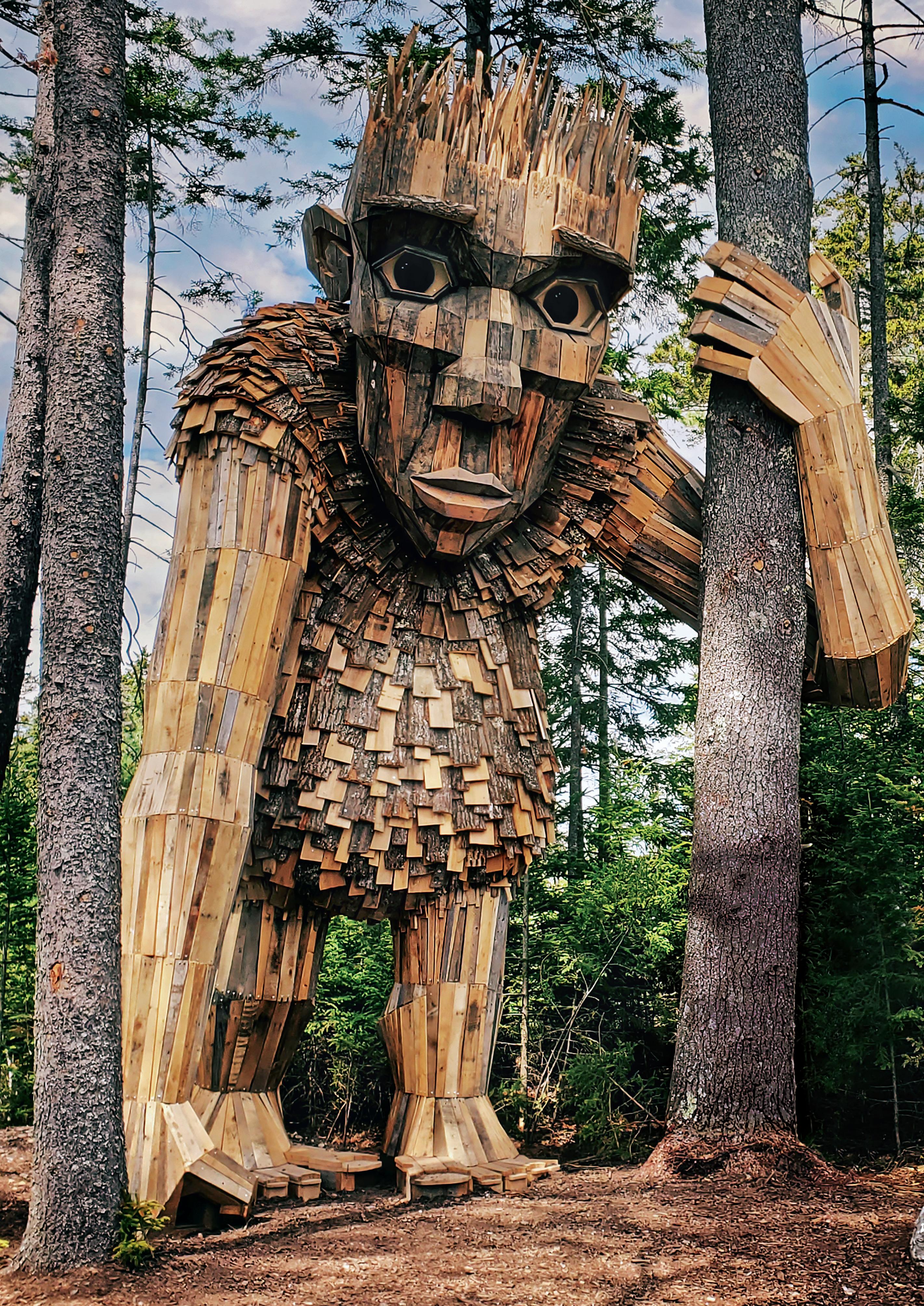
Talk To A Mate
How we can stay connected and feel valued
Dogged determination
Finding a suitable premises for the new community shed
Newsletter | May 2023 | issue 01 Community Sheds | Men’s Sheds | Living Well
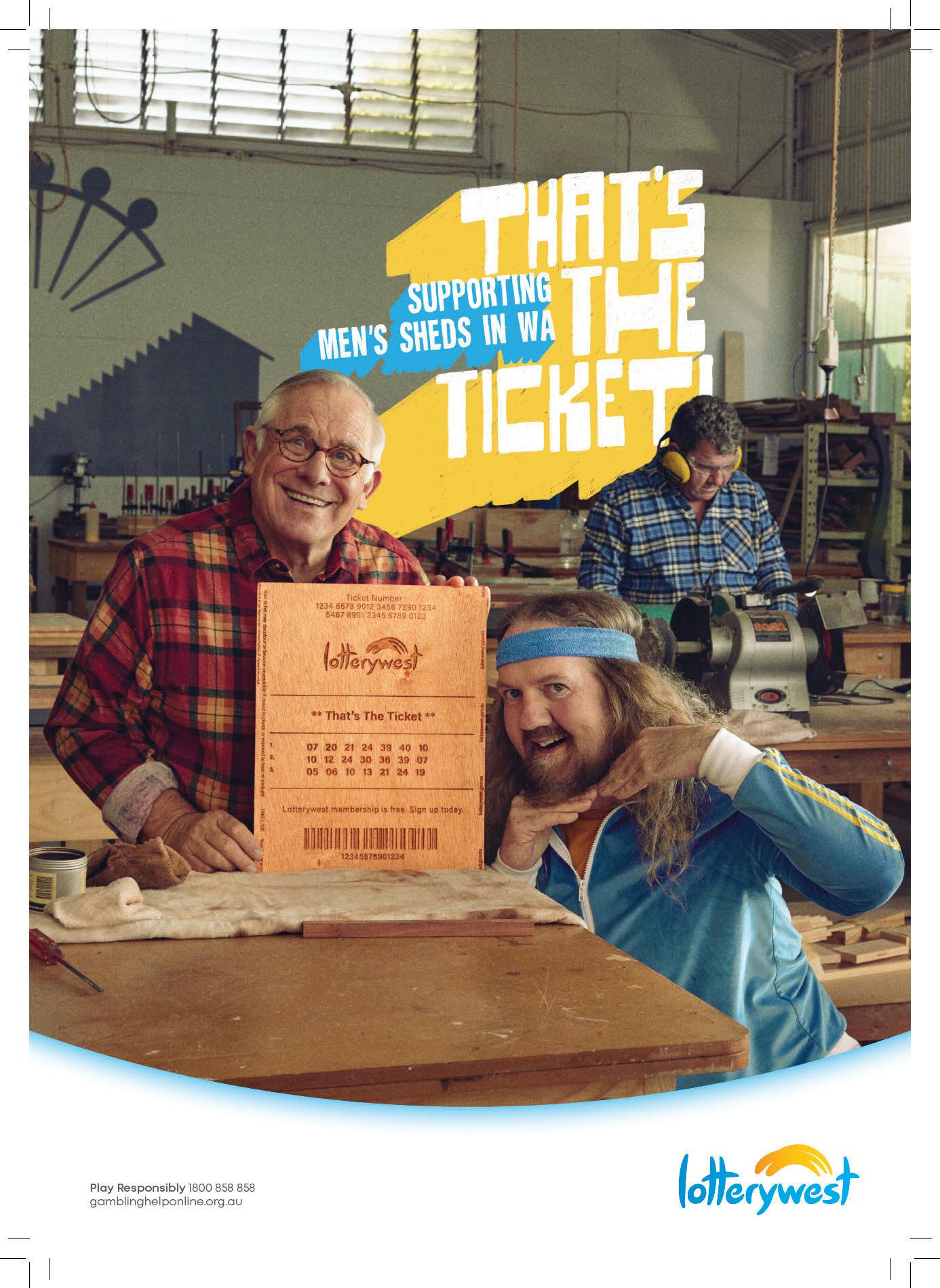
If you would like to comment on any aspect of this newsletter, please contact us on: (08) 6381 5324 or e-mail: admin@mensshedswa.org.au www.mensshedswa.org.au
To provide content:
https://mensshedswa.org.au/ shed-resources/sheds-wa/
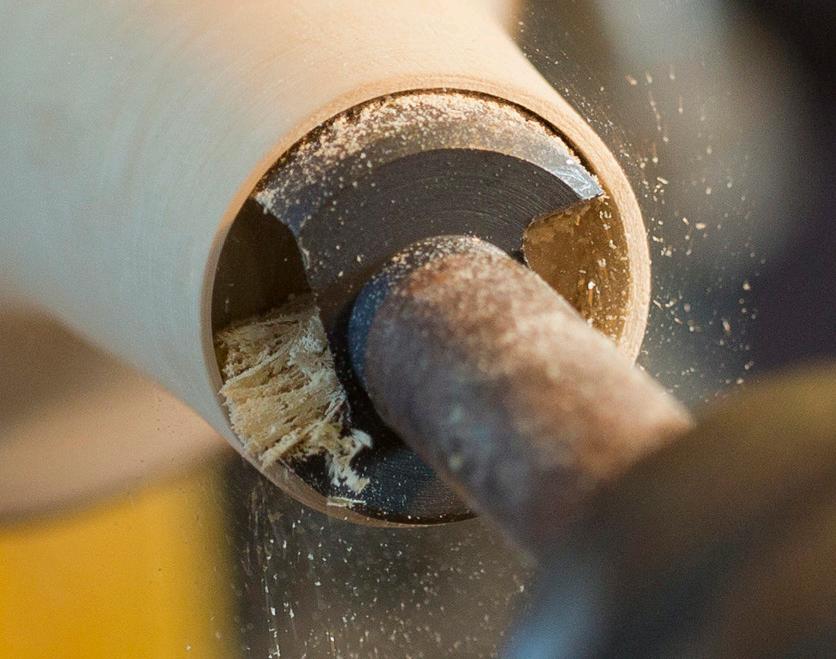

To discuss stories contribution please contact the team at admin@mensshedswa.org.au
Copy provided throughout the magazine by Amanda Haines
Credit to Gordon for producing the magazine
Image credits?
Cover Roskva by Thomas Dambo, Coastal Maine Botanical Garden, USA. Photo courtesy of Thomas Dambo & FORM
3, 9 James Campbell photograhy, 4 Lottterywest, 6-7, 10 Amanda Haines, 12-13 Thomas Dambo Boom - Breckenridge, Colorado, 2018, 14 Echo Newspaper, 15 Gidgegannup Men’s Shed, 17 Men’s Sheds of WA, 21 Shutterstock, 22-23 Soldiers and Sirens, 25 Foodbank WA
All rights reserved. No part of this publication may be reproduced, stored in a retrieval system, or transmitted, in any form or by any means, electronic, mechanical, photocopying, recording or otherwise without the prior written permission of the Publisher and copyright owners.
The contents of this publication are believed correct at the time of printing. Nevertheless the Publisher can accept no responsibility for errors or omissions, changes in the detail given or for any expense or loss thereby caused.
Men’s Sheds of WA does not warrant that any website mentioned in this title will be provided uninterrupted, that any website will be error free, that defects will be corrected, or that the website or the server that makes it available are free of viruses or bugs. For full terms and conditions please refer to the site terms provided on the website
3 Contact Us / Credits 4 Welcome from CEO 6 Dogged determination 8 Talk to a Mate® 10 Shed’s heart of glass 12 On the shoulders of Giants 14 Shed in focus: Gidgegannup Men’s Shed 17 Staying safe, staying strong 18 What Makes a Successful Shed? 20 The most important tool in the shed 22 Victoria Park, Project: Soldiers + Sirens 25 Helping our community ….its just what we do! MAY 23 NEWSLETTER 3
Vertical
Primary
facebook.com/mensshedswa Contents
SHEDS WA
Welcome to our first edition of our new magazine for sheds in WA We have created the magazine in response to requests from sheds, stakeholders and people interested in the men’s shed and community shed movement.
I thought it would be helpful to write a brief note on what you can expect to find in the magazine.
Sheds are great at what they do, supporting their members, helping their communities, and promoting wellbeing and men’s health. When the team visit the 180+ men’s sheds and community sheds up and down the state we have come to realise that they are filled with hidden gold. There are many unique projects that aren’t shared beyond the shed walls. We have many fascinating stories about the people involved, how they are benefited
by the shed and how they are helping their communities through the shed. The aim of this magazine is to tell some of these stories and to share that gold. There will be stories on individuals, stories on sheds, and articles that will be of interest to people in and around the shed movement. We will also have an opportunity to share information on wellbeing and health and to connect people that are interested in the movement with service deliverers and leaders in the health sector. I do hope that you enjoy reading the magazine. Please feel free to get in touch with the team and of course send us your stories.
Happy reading
James Wild CEO, Men’s Sheds of WA

4 sheds wa





Dogged determination
Whether it was long-departed pigeons, recalcitrant teenagers or a mountain of paperwork, the founders of the Fremantle Men’s Community Shed overcame many hurdles to get the first WA metropolitan shed up and running.
Alan Gowland and Bill Johnstone –respectively the first and second life members of the shed association – put their considerable life skills to use in the preparation stage of what they identified as a much-needed resource for their local community.
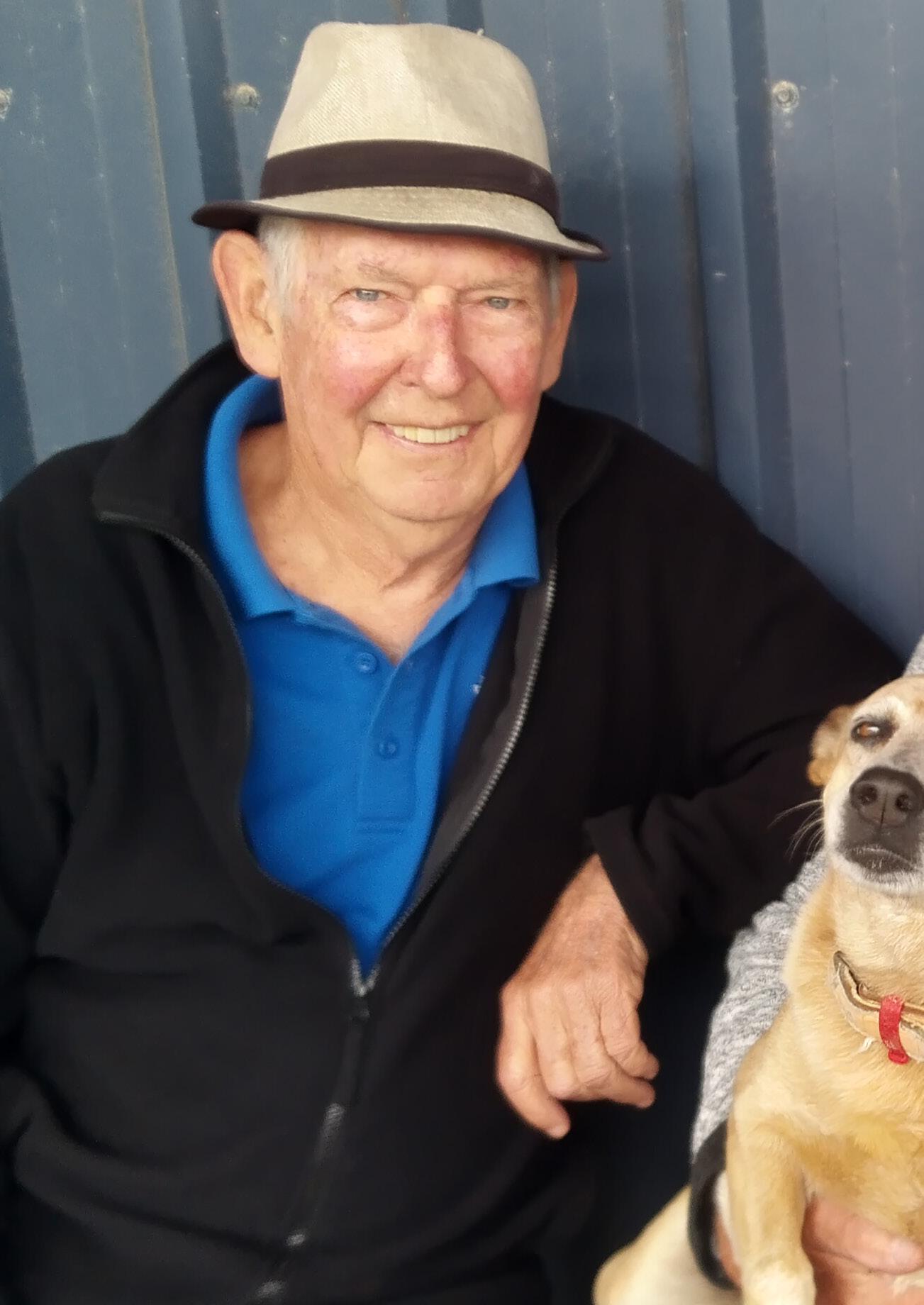
Now vice patron of Sheds WA and Senior Men’s Shed Advisor, Bill was working for the education department where he instigated a program to help students who were reluctant to go to school.
The students were welcomed to the Nambucca Heads (NSW) Men’s Shed where they were encouraged to learn different skills.
“The kids loved it, they learned to follow the rules and instructions,” Bill said. Further down the track, Bill was reminded of how the shed had helped the youngsters
and was spurred on to recreate a similar shed in the Fremantle area.
“There was a need for it as Fremantle has the same demographic as Nambucca; it’s a seaside town and has similar economic and social issues,” he said.
An experienced carpenter by trade, Alan was the perfect accomplice to help in the mission.
“We make a good team so we gave it a go,” he said.
“We put a notice in the paper and 30 people turned up – that’s when we knew we were on to a winner.”
Finding a suitable premises for the new community shed was just the first hurdle the pair had to deal with.
“We tried for a year to find a place for a shed and we were getting demoralised as we couldn’t find one,” Alan said.
It was the suggestion of former Fremantle mayor Peter Tagliaferri in 2005 that the old Pigeon Club in White Gum Valley could be a possible site.
The club had been vacant for quite a while and was derelict but Bill and Alan could see the potential.
There was just one problem – they weren’t the only ones interested in the site.
6 sheds wa
Fremantle Men’s Community Shed founders Bill Johnstone (left) and Alan Gowland, with Cassie the dog.
“The man in charge of the Pigeon Club said other people were interested in using the property, including a choral society and a dancing group,” Bill said.
“But his wife, who was the secretary of the Pigeon Club, said we could have it as long as we took her husband in as a member.
“Which we did.”
The new Men’s Shed became so popular it outgrew its original venue and in 2016 relocated to the purpose-built property in Beaconsfield it now occupies.
With the new premises, the scope of shed projects and activities became even broader and the two original shedders are justly proud of what an important part of the community the shed has become. “It is all about community engagement,” Bill said.
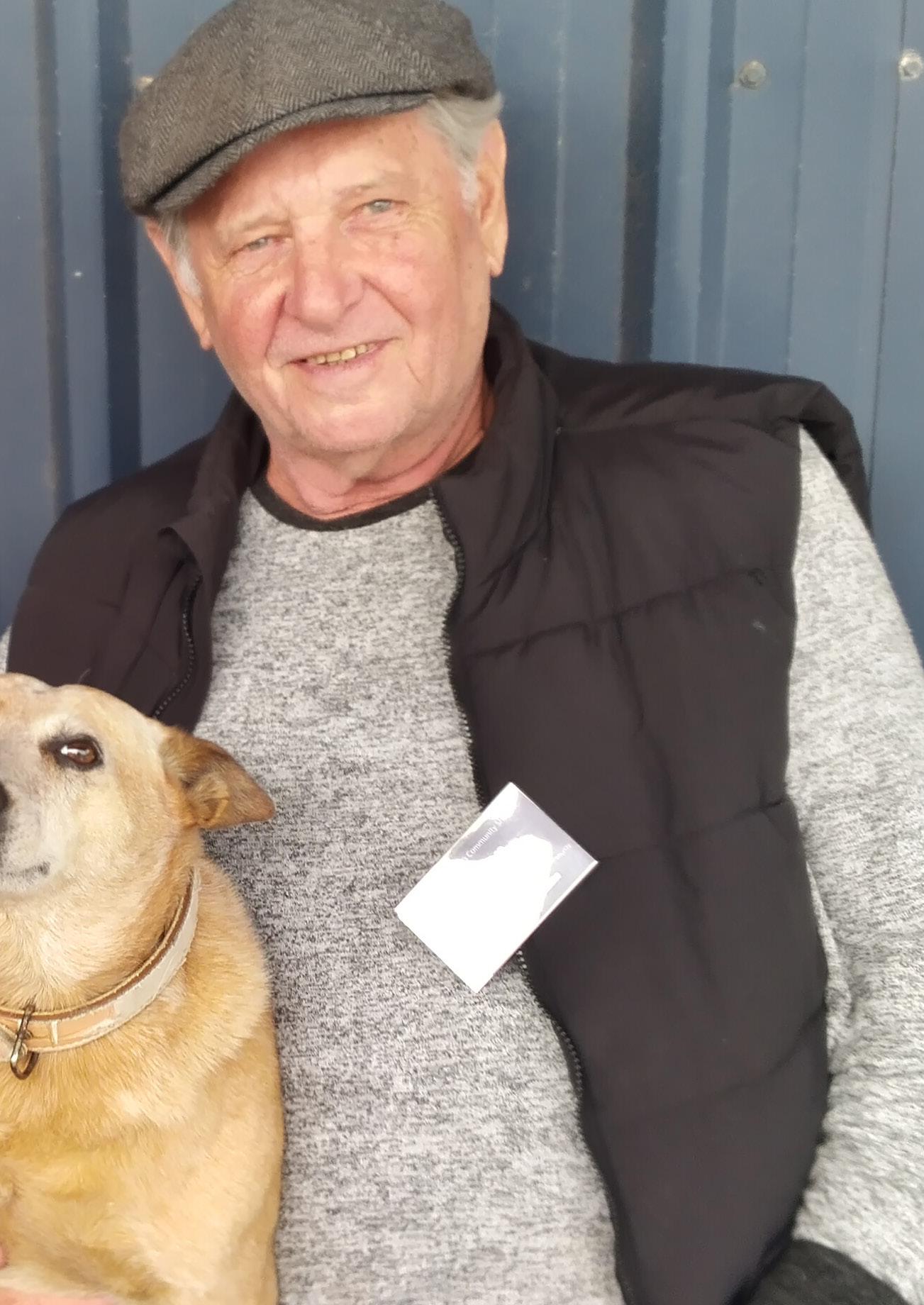
“We have worked with children, refugees, mental health programs … the value of it just goes on and on.
“Once we got started, we helped fast track other Men’s Sheds, helping with all the paperwork.
“We advised on insurance, public liability, occupational health and safety, working with children checks, fair work policies.”
While the day-to-day logistics of setting up and running a shed can be time-
consuming, the pair agrees it all pays off in the end.
“ Just seeing how it has evolved is brilliant,” Alan said.
“I hadn’t been (at the shed) for a while recently so I came up just to feel the warmth of the communication and banter with the guys.
“We ended up watching the Queen’s funeral together.”
That warmth can be felt in all sections of the shed and extends to the whole community.
“We were the first ones to invite women in and it actually worked,” Alan said.
“We are an all-community shed – of our 374 members, 74 are women.”
The initial inspiration and impetus to create a safe and welcoming community space which can help people is still evident in the shed today.
“Kids that don’t get on at school come here,” Bill said.
“They learn skills. If they have a negative attitude, Alan turns them around while teaching them carpentry.
“We have turned a lot of kids around, and a lot of men who were desperate.
“We give their lives stucture. We all get together and share ideas.”
MAY 23 NEWSLETTER 7
Talk to a Mate®
Reprinted with permission from the Regional Men’s Health Initiative
The message we give in everything we do is … before it all gets too much… Talk to a Mate®!! As human beings we are fundamentally social in nature, staying connected and feeling valued for who we are is of primary importance to us. Talking to other people about issues in our lives or telling our stories helps us to normalise our experiences and realise we are not alone in having them. As blokes we tend to retreat into ourselves when things are turning pear shaped (cave time), much to the frustration of most women. This is the normal way men tend to start processing their problems.
Metaphorically stepping into the cave can be helpful to get a handle on things but it is important that we are able to acknowledge and recognise when it is time to step back out and seek the support we need. Having a plan already in place that identifies who the mates are that we can turn to is important. Without a network of true mates, we become susceptible to feelings of isolation and loneliness.
As blokes we can recognise three main categories from where we find and establish real mateship. These exist usually in the forms of a partner (intimate relationship), a peer (someone around the same age that perhaps has a similar experience of lifestyle and activities to us) and a mentor (an older person whose lived experience we place value upon). A real mate is more than just an associate, it’s someone that knowingly respects and values who we are and is willing to make the time to genuinely listen to us.
Think about who you would classify as a mate; and about the blokes you know who perhaps have few or none of these categories in their lives?
Often it is said that blokes in general don’t really like to talk about stuff and if we disclose that we have a few problems someone will exploit our problem or weakness, but the reality is quite different. Given the right environment, where we feel safe most men will willingly share their story and talk about issues that matter to them and there is real value in realizing that there are other men experiencing the same things (no matter what the issue). Being a good mate is about supporting a person in that space and genuinely listening to what they have to say. We don’t have to be an expert or necessarily have any of the answers to people’s problems, just the ability to listen with empathy.
Being a good mate is also about actively looking out for the people we care about and acting when we recognise that something is not quite right. If we have a gut feel that someone we know is not travelling well, don’t be afraid to ask them how they are going and ask more than once!
As men we need to encourage help seeking behaviour and be prepared to be the one to Talk to a Mate® when we know he’s not travelling well and/or know that a mate is down or experiencing difficulties. It isn’t rocket science and it does work.
By The Regional Men’s Health Initiative

8 sheds wa
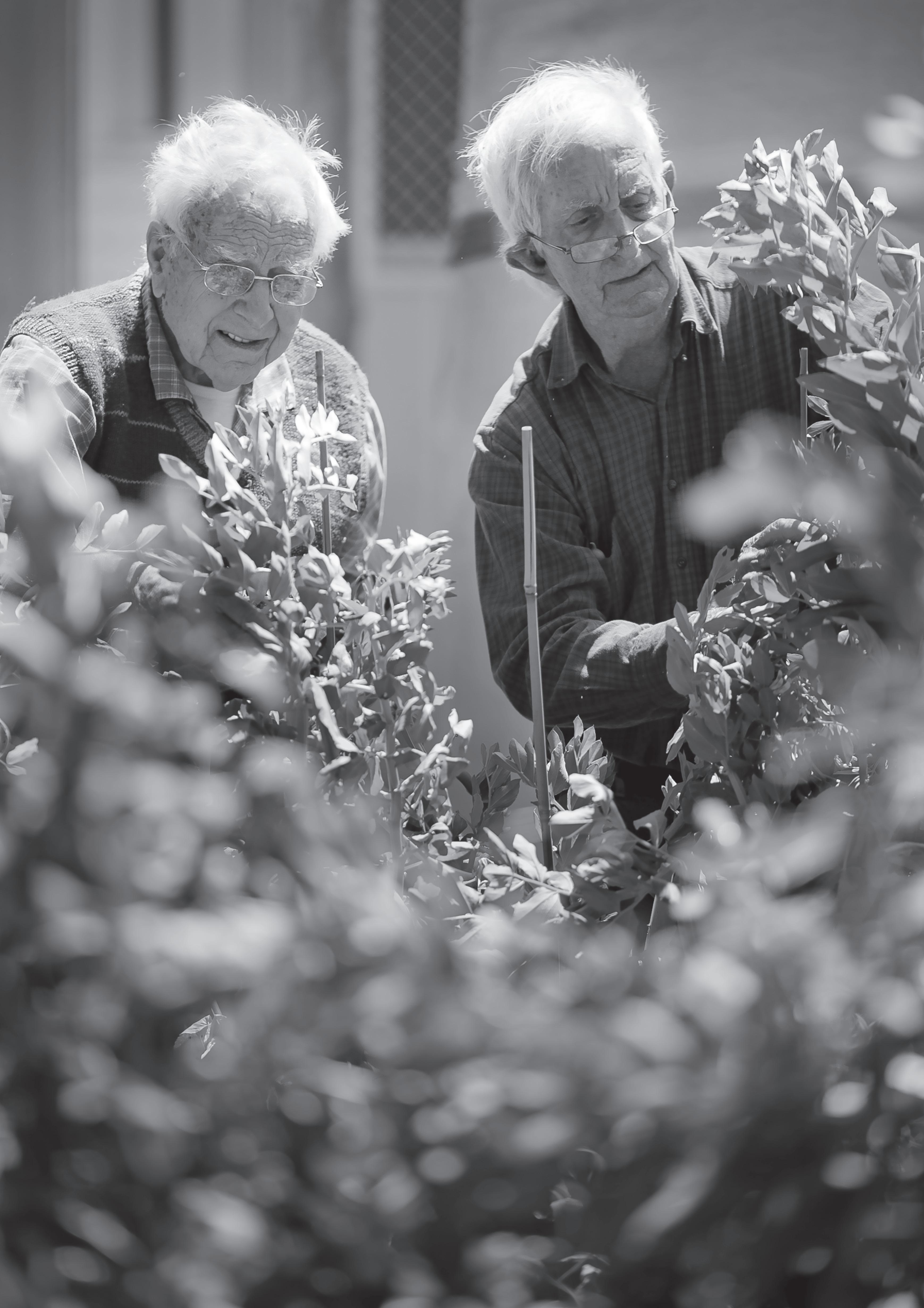
“ listening is often the only thing needed to help someone.
Shed’s heart of glass
Terry
Hidden away in a small cabin along a leafy path beside the Fremantle Men’s Shed, Terry Scudder picks up a hammer and taps at a colourful pane of glass.
The glass is purple and rippled and, once common in older houses in the local area, has become increasingly rare as gentrification and modernisation take hold.
But there have been enough old panes saved during renovations and donated to the shed for Terry to put them to good use. His stained glass workshops have proved popular with shed members and are held three times a year.
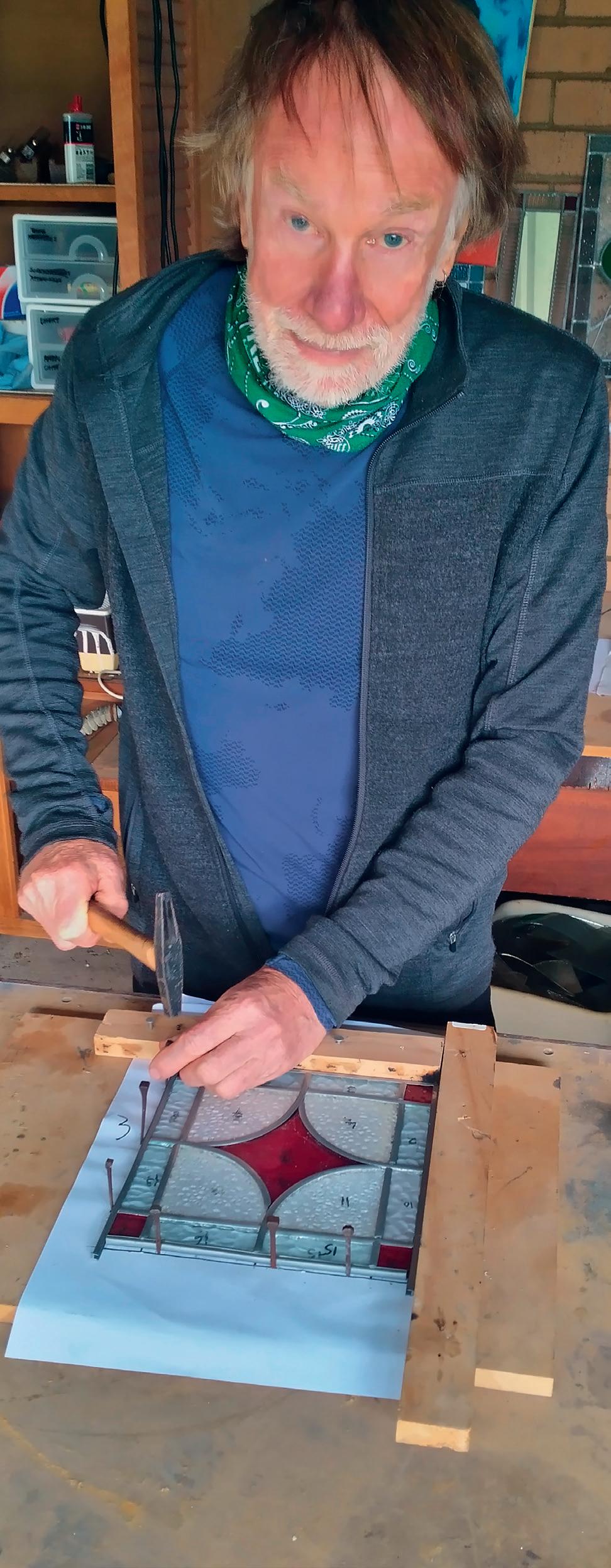
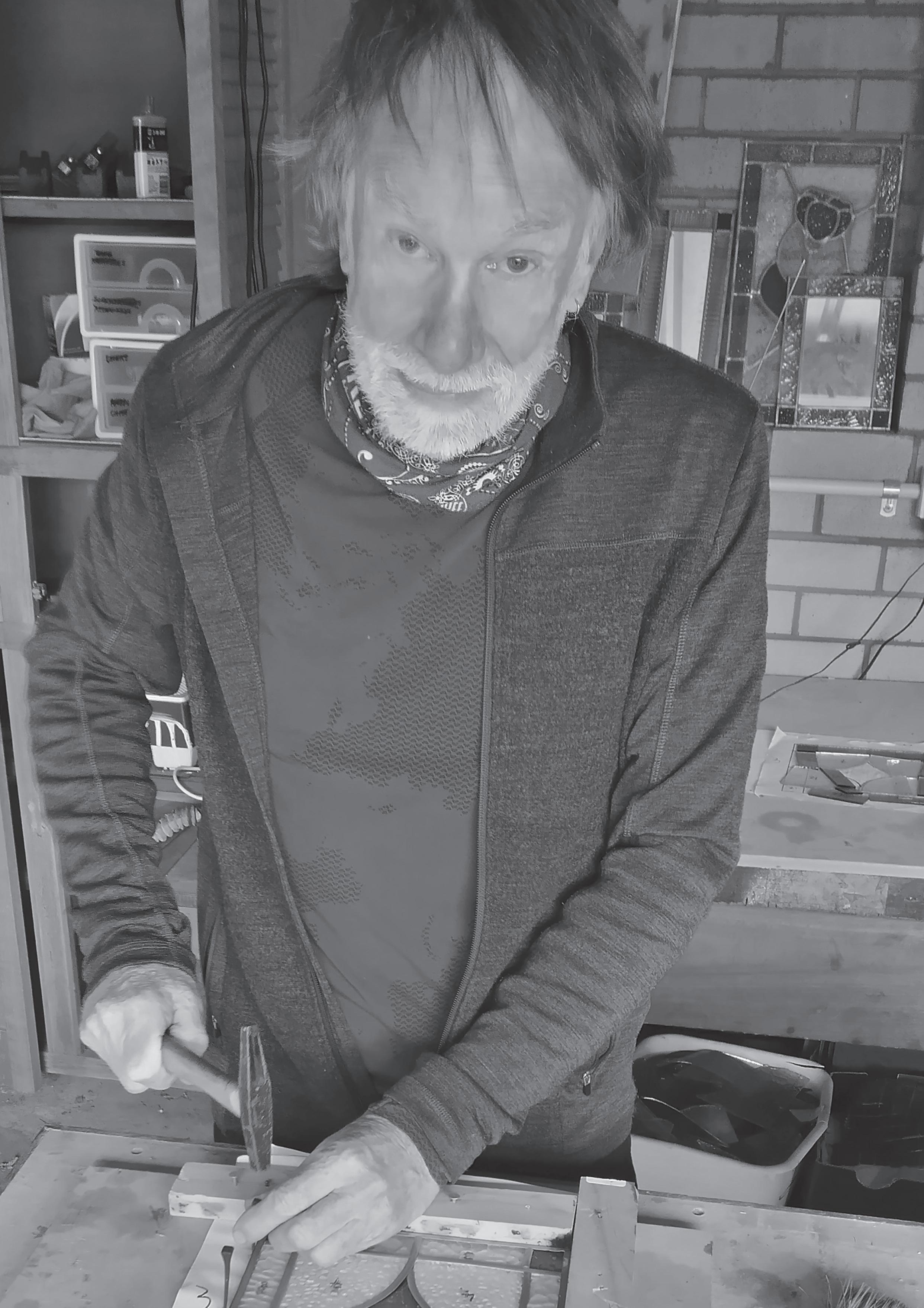
“It is a bit of fun, we have a laugh and we get creative,” Terry said.
“The glass is donated; there are a lot of buildings in the area which have been demolished and people have donated the old glass to us.”
Instead of the glass going to waste, the group repurposes it into something to admire.
At the same time, it teaches useful skills to members and non-members – which, this being the Fremantle Men’s Community Shed, includes both men and women.
“It is mainly women who come along but we give priority to shed members,” Terry said. While there is a nominal fee for the threeweek workshops, the participants enjoy a lot more than just picking up new skills. Other activities at the Fremantle Shed include music groups, mosaic classes and ceramics workshops.
“A lot of people just come to the shed to talk,” Terry said.
“But for those who want something creative to do, the shed can be a real surprise.
“You don’t realise the depth of activities here – it is not just woodwork.”
10 sheds wa
Scudder runs stained glass workshops at the Fremantle Men’s Community Shed.
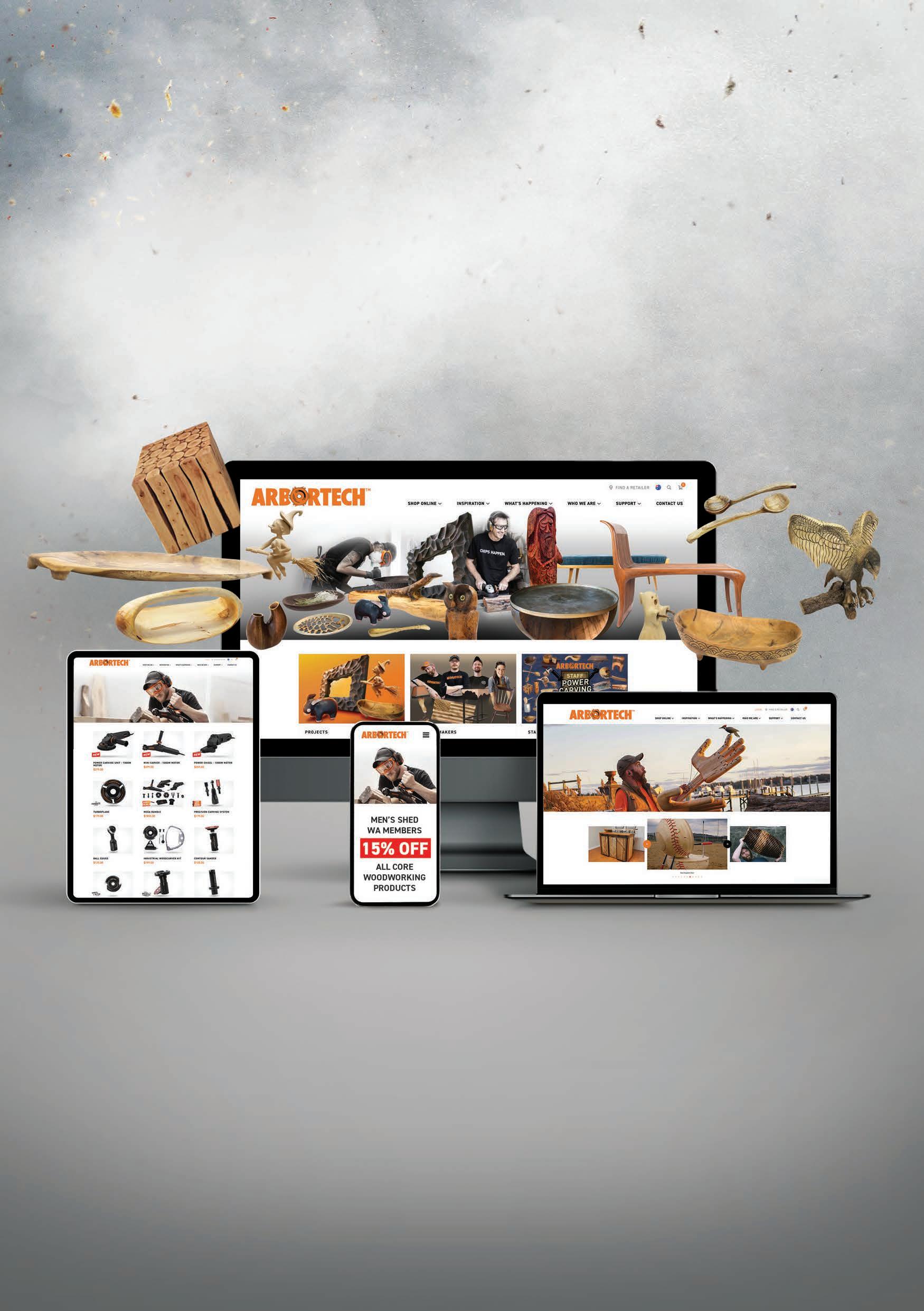


Come explore ArbortechTools.com Your destination for everything power carving 15% OFF ALL CORE WOODWORKING PRODUCTS VIP discount for Men’s Shed WA members Use code: MSWA15 at the checkout Not to be used in conjunction with any other offer.
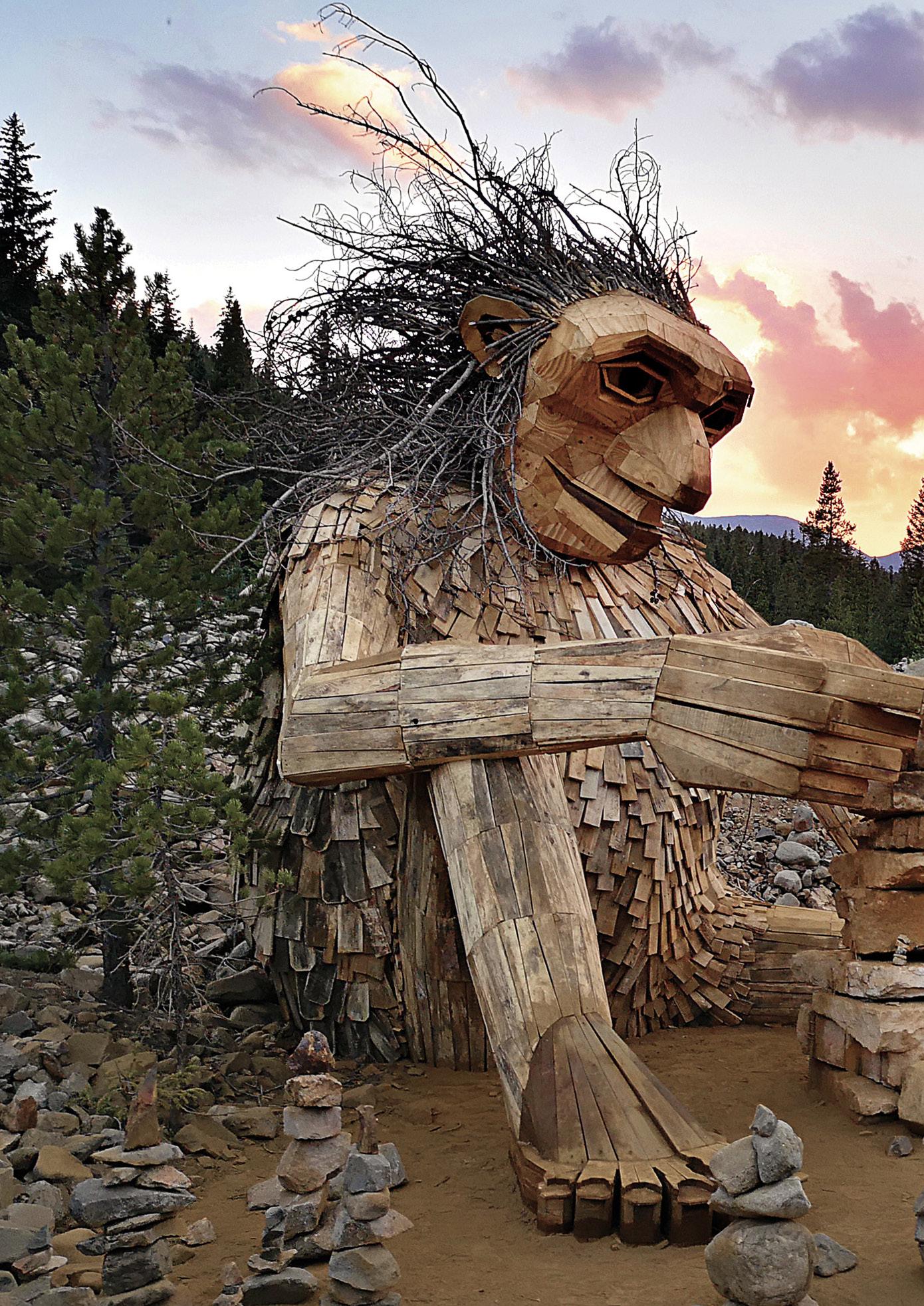
12 sheds wa
On the shoulders of Giants
Where do trolls come from?
In the case of five estuary-dwelling characters on display in the Peel region, the Mandurah Men’s Shed is instrumental in their creation.
The shed collected and stored the salvaged and recycled timber for the Thomas Dambo Giants of Mandurah exhibition presented in collaboration with the City of Mandurah and Tourism WA.
Danish artist Thomas Dambo was commissioned to create the giant troll sculptures that have come to life in the bushland surrounding Mandurah’s iconic estuary.
The troll trail opened in November 2022 and has delighted both locals and international visitors, with the tourist attraction, a major player in Mandurah’s efforts to recover economically from the effects of the Covid-19 pandemic.
The project highlights Mandurah’s globally significant Ramsar-listed wetlands and unique waterways, bushland and wildlife.
“We are shaped, both geographically and culturally by our waterways and natural environment, making us the perfect canvas to host Thomas’ first foray into Australia,” City of Mandurah mayor Rhys Williams said.
The artistic narrative and environmental story sits alongside a creation story by the region’s traditional owners, the Bindjareb people.
Composed of scraps of timber which would otherwise be thrown on the rubbish heap, the trolls –some of them 10 metres high –take recycling to new heights.
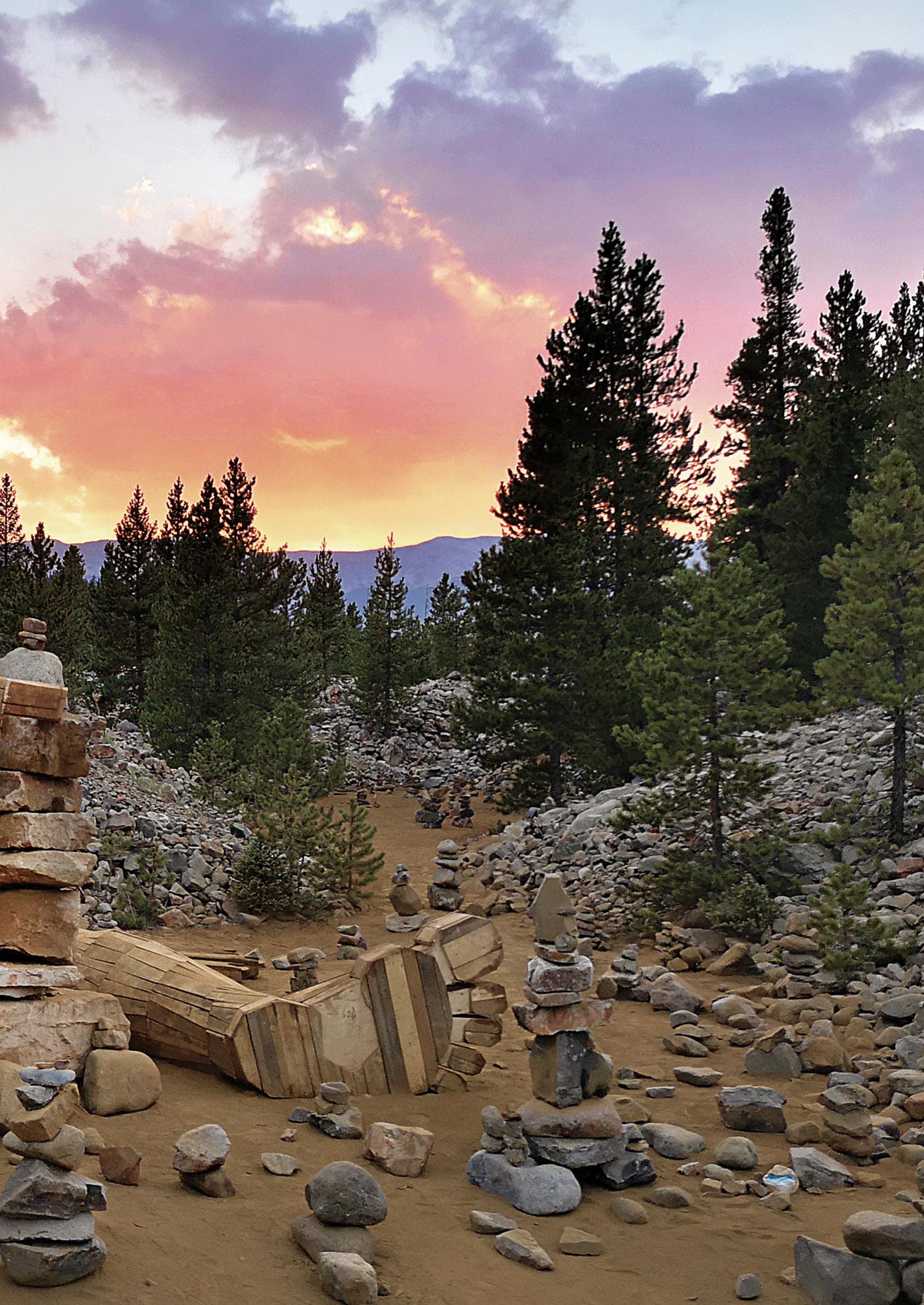
Both an artist and activist, Dambo’s practice celebrates the diversity, beauty and importance of the natural world, and through his ‘trash to treasure’ approach, he highlights the possibilities found in waste and the urgency of environmental sustainability.
“We can design an entire world out of trash when we know what to do with it,” Dambo said.
“That’s why I build these largerthan-life projects out of recycled wood and materials. I hope my work inspires others to be kinder to nature and our planet.”
All that timber took time to collect and the Mandurah Men’s Shed was more than happy to help out.
“We use a lot of recycled timber in our own projects so we know the best places to source and store the material,” shed secretary Trevor Stewart said.
“Being involved in a community art project like this is just an extension of what we are all about.”
These latest inhabitants of the local bush, whose creation would not have possible without the men in the shed are protectors of the environment, and placed in secret locations to be discovered and explored by locals and visitors alike.
MAY 23 NEWSLETTER 13
Shed in focus: Gidgegannup Men’s Shed
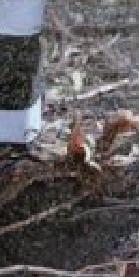



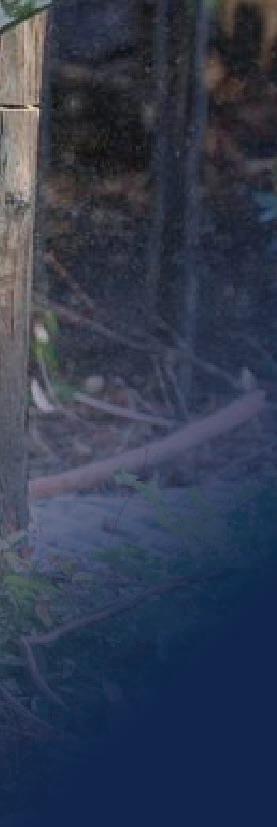
Gidgegannup Men’s Shed members Jorg and Alison light the first anniversary cake.
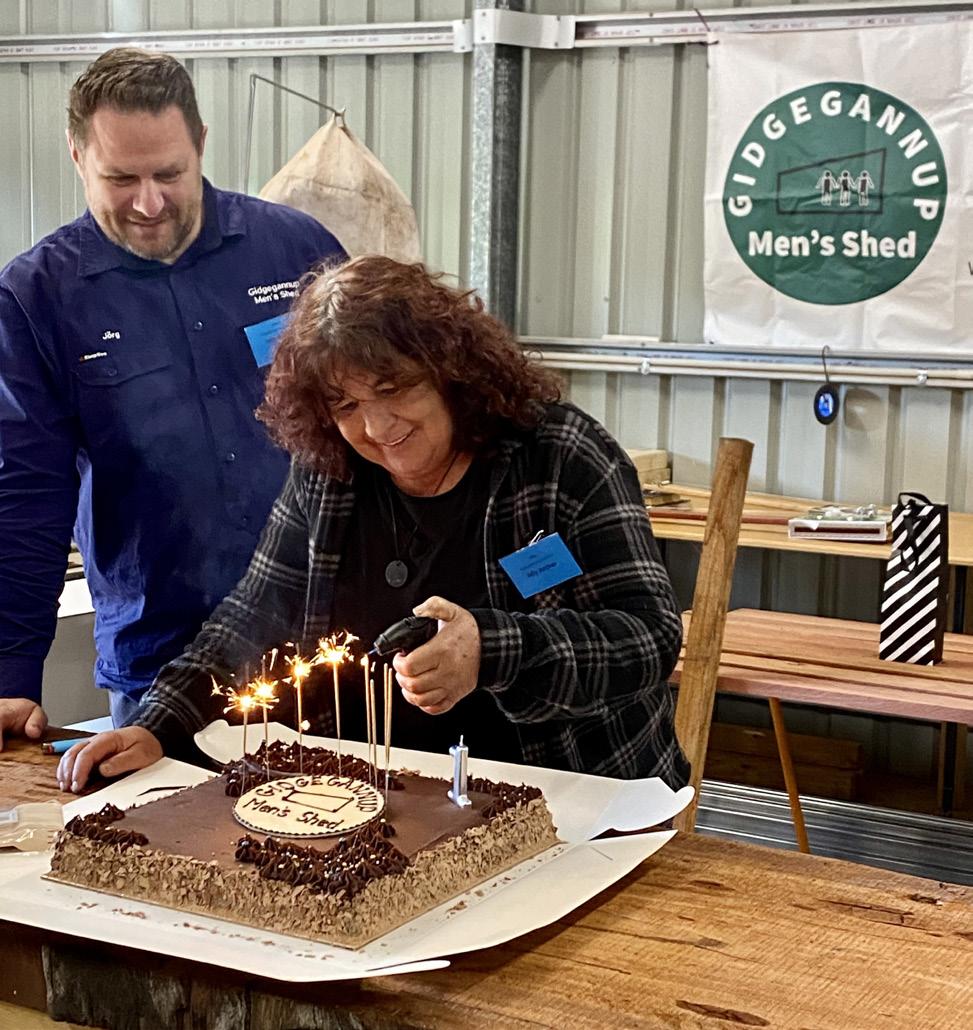
Born out of a critical need for community support, the Gidgegannup Men’s Shed is going from strength to strength.
After the February 2021 bushfire that tore through Wooroloo and Gidgegannup, residents and members of the bush fire recovery group bound together to establish a community group that would include men.

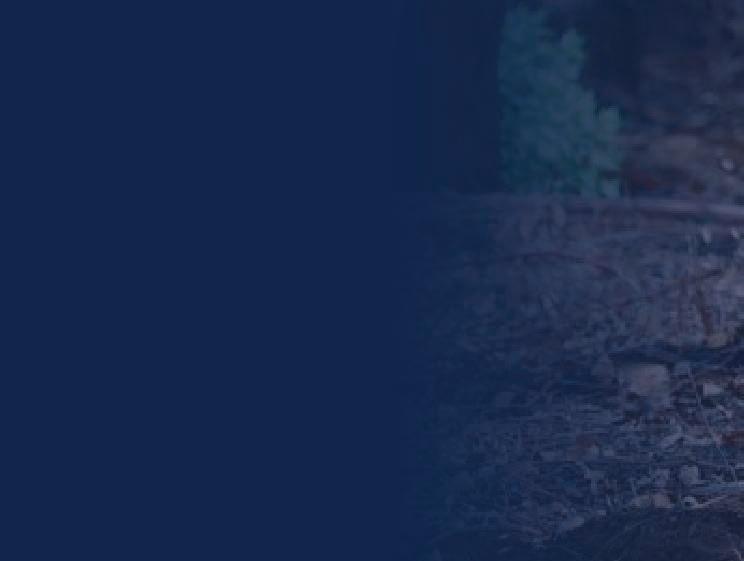

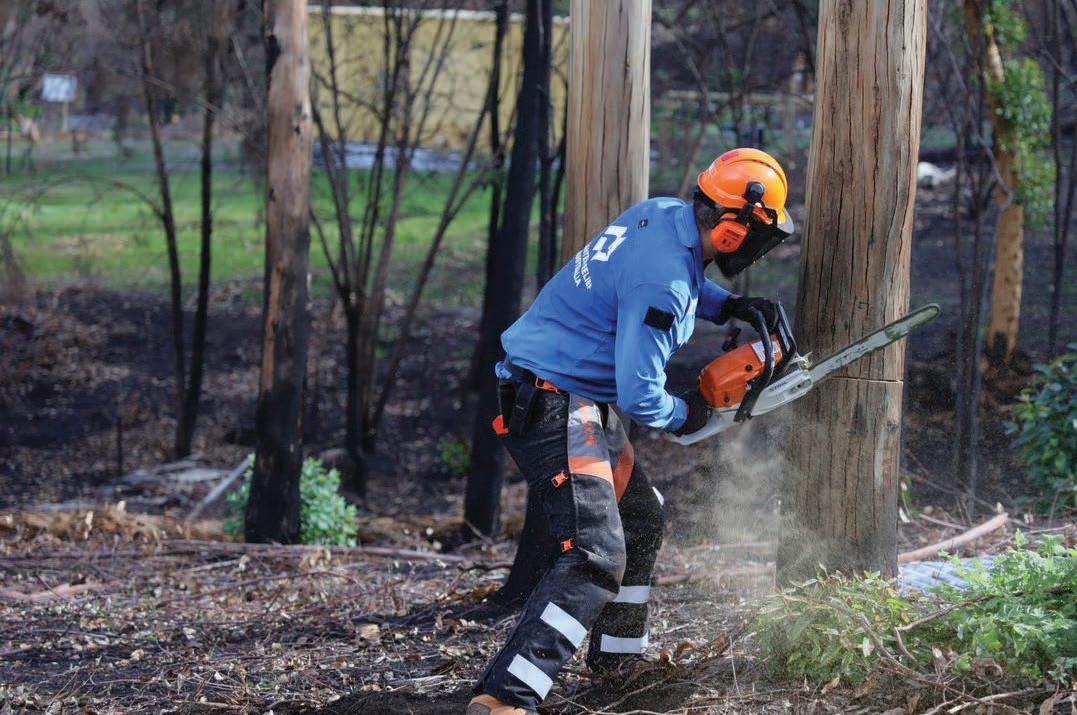
The Gidgegannup Men’s Shed was formed in June 21 and since then they’ve played a vital role in fostering recovery efforts.
“The men’s shed is primarily focused on mental health, forming friendships and drawing people out of their homes and into a vibrant centre,” president Bruce Williams said.
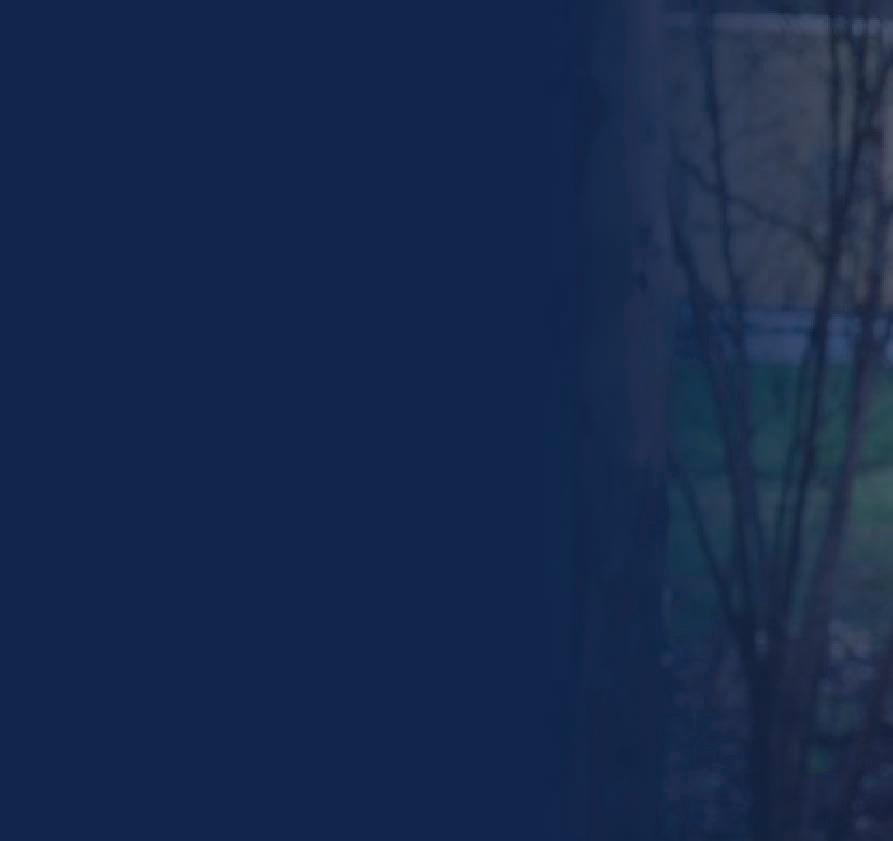
“One thing that confused a lot of people about our men’s shed was that they thought we were just starting up a workshop, but we have decided to build a much broader community hub.”



Are you built to serve a community in need? Then serve with us! disasterreliefaus.org Continue to serve where Australia needs you. Join as a volunteer today! Scan me
14 sheds wa
Birthday cake photo Reprinted with permission from the Echo Newspaper
Since its inception the group has taken over permanent management of the Gidgegannup Tool Library designed to provide resources for bushfire affected residents and worked with BlazeAid to build a trailer and team to re-fence properties. In March last year the shed committee opened its doors to women and anyone over 18 and the group shot up from 29 to 50 members.
“We are about bringing people together, training them and having a hell of a lot of fun while doing it and that principle applies to men, women and young adults,” Mr Williams added.
While the group operates from the Ian Stannard Pavillion in Gidgegannup, they are intending to significantly upsize with plans to build on a 5000sqm block to adequately serve their targeted community spanning 45km from Red Hill to Morangup.
“We have been designing a new shed to be built somewhere in Gidgegannup and are working with City of Swan regarding planning requirements.
“We visited 12 other men’s sheds around Perth and saw the need to build a large
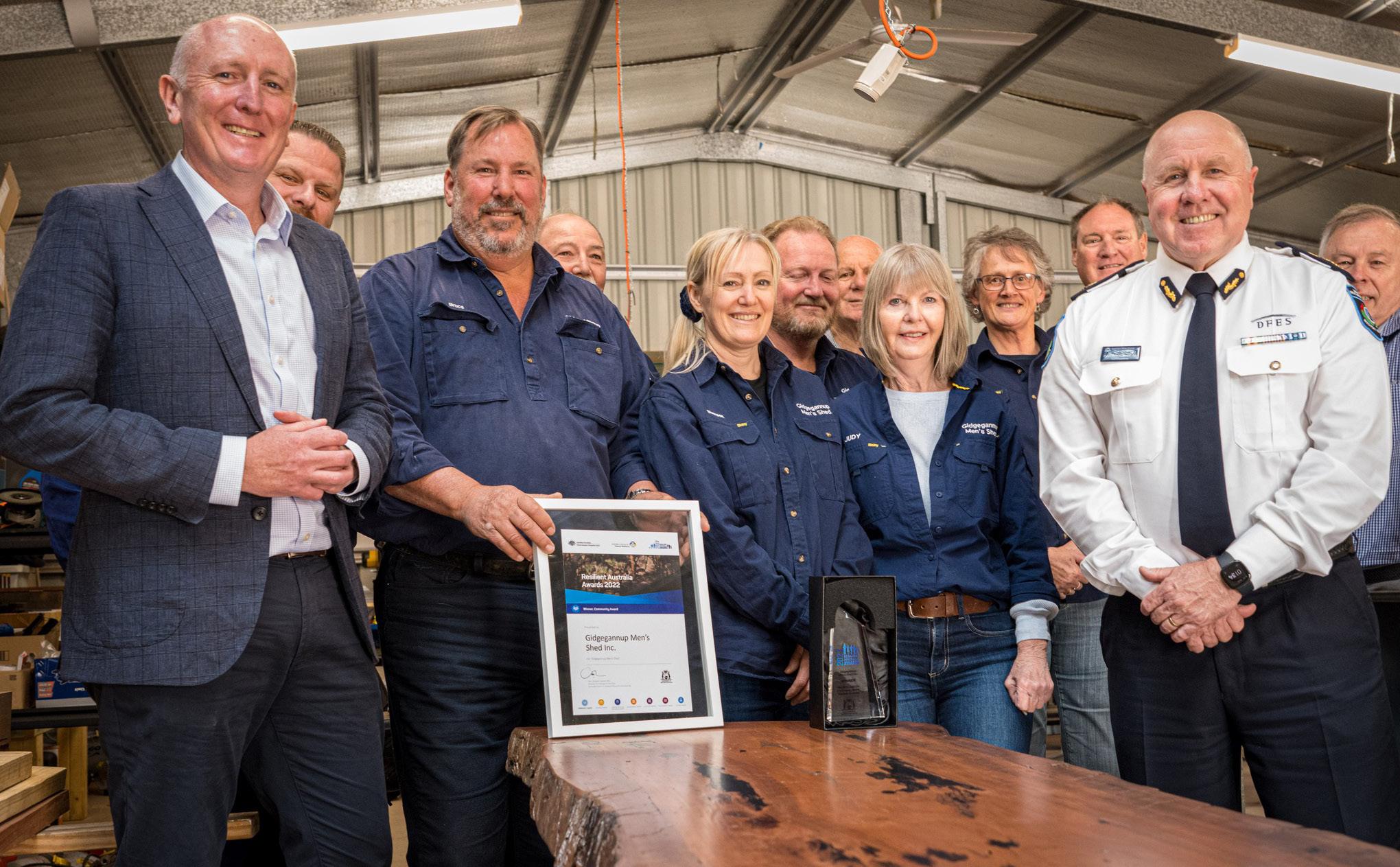
facility because as the group grows, we will be space constrained.”
To round off an amazing start, the Shed was honoured to receive the 2022 Community category award in the Resilient Australia Awards. A ceremony was held at the Shed to recognise winners and highly commended recipients. The WA awards were presented by Hon Stephen Dawson MLC, Minister for Emergency Services, and Emergency Services Commissioner, Darren Klemm AFSM.
The Minister said of the achievement: “A community social group born from the despair caused by a major bushfire is one of four Western Australian initiatives recognised in the Resilient Australia Awards. The Gidgegannup Men’s Shed was created to help the local community recover following the Wooroloo bushfire, which swept through the area in February 2021. The facility, open to both men and women, won the Community category in the 2022 national awards.”
The photos show Stephen Dawson and Darren Klemm with Bruce Williams, President GMS holding the award, and members of Gidgegannup Men’s Shed.
MAY 23 NEWSLETTER 15
Gidgegannup Men’s Shed members Jorg and Alison light the first anniversary cake in 2022.
70%
of sleep per night is recommended to avoid fatigued driving
7.5hrs of serious crashes are caused by symptoms of fatigue
20min
power nap can refresh a driver and prevent fatigue related crashes
effects of fatigue
17-19 hours awake is equivalent to 0.05 BAC
Dangers of microsleep
24 hours awake is equivalent to 0.10 BAC
*Blood Alcohol Concentration (BAC)
When you’re driving tired, you can drift in and out of sleep without knowing it. Sleep experts call this a micro-sleep and can last three to five seconds. They are the main cause of fatigue-related crashes. A micro-sleep of five seconds at 110km/h is like travelling the length of an Aussie rules football field with your eyes closed.
FACTS AT A GLANCE
Fatigue
rsc.wa.gov.au
152.78m 97.2m
wARNING SIGNS
WARNING SIGNS physical wARNING SIGNS Wandering Thoughts Braking late missing a gear slowing unintentionally yawning blinking more forget driving last few kms trouble keeping head up
EARLY
FATIGUE
*
* (Reaction time) (Reaction time)
Staying safe, staying strong
Richard McAlister, Chaplain, Men’s Sheds of WA
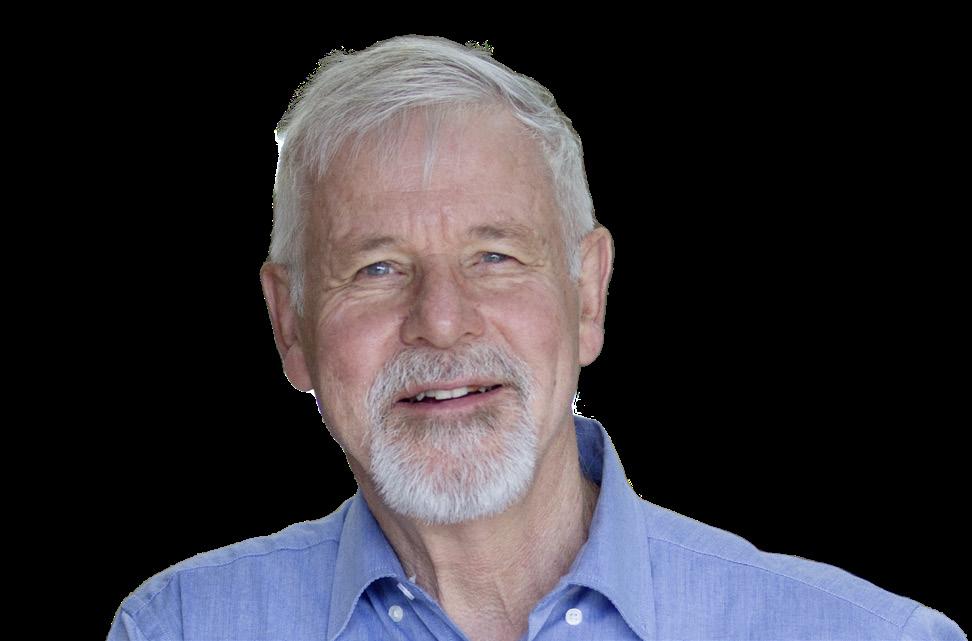
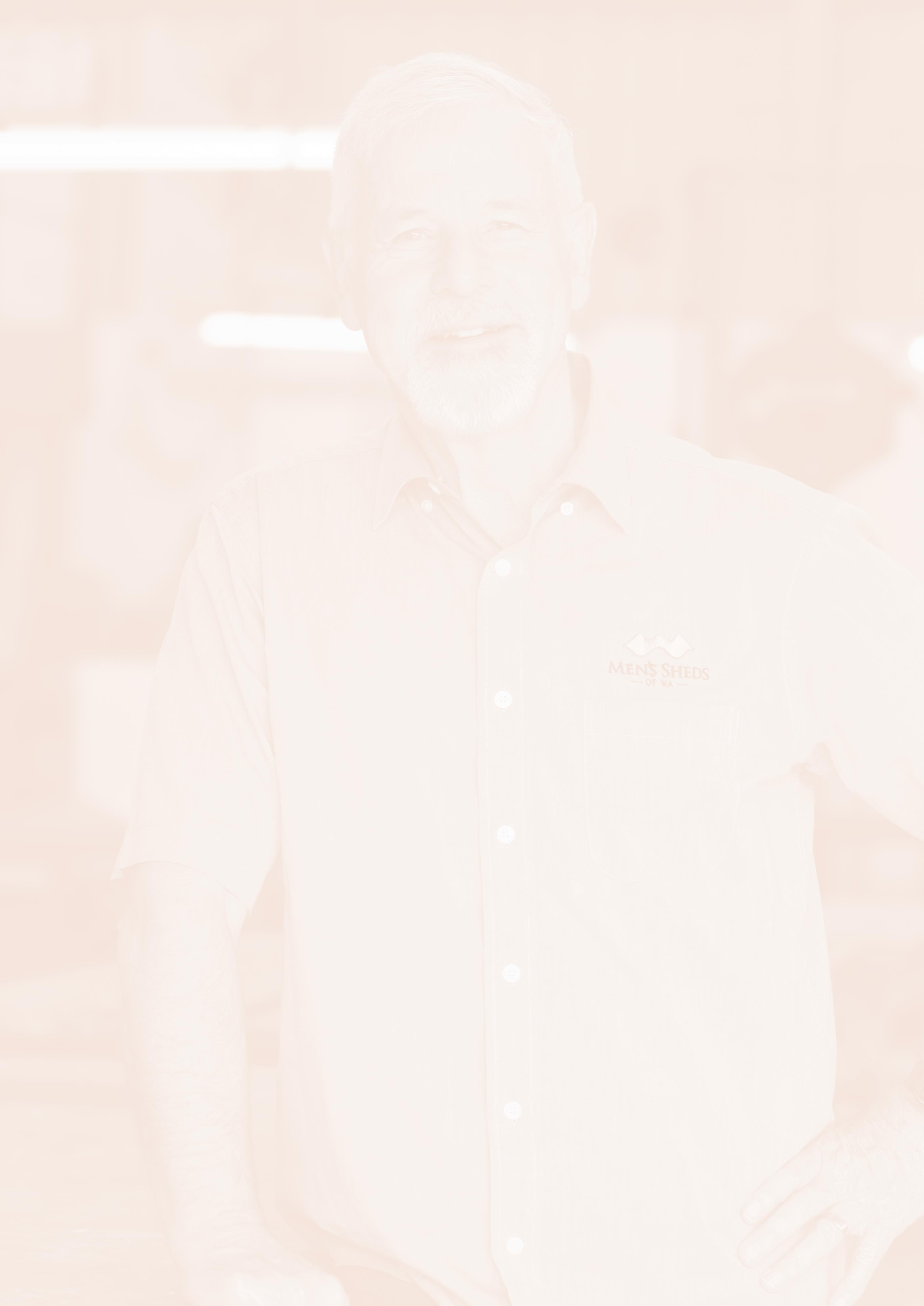
I hope that you are enjoying our first edition of Sheds WA. As Chaplain my role is to work with Wellbeing and Health Officers within men’s sheds. These officers are volunteerswho facilitate activities that support health and wellbeing within the shed, and they regularly check in with the other members. Together we work to ensure that each shed member has access to support and help when they need it.
When I visit sheds, or am talking to a shed member, I try to provide strategies that I’ve applied to my life that have helped me cope through difficult times. Hopefully shed members find these strategies helpful. These strategies aren’t mind-blowing, but during challenging times, we often need a friend to talk to and a reminder to look after ourselves.
One of these strategies I call the ‘oxygen mask’. You’ve no doubt seen the video on the plane before take-off where the oxygen mask drops, and it says put it on yourself before you look after others. This is a great lesson in life. We are often so focused on our families our friends and our shedmates that we forget that we also have a duty of care to ourselves. In my role I sit and talk to many men who are husbands, fathers, grandfathers. At times they have all felt a burden of responsibility, a sense of pressure that comes with caring for those around them. I often say to these guys that to be effective in looking after others we need to look after our own health and wellbeing first. We need to put our ‘oxygen mask’ on and breathe deeply. The oxygen mask can have many manifestations. It can be a bit of time on your own or conversely spending time with friends. It can be a walk in the park, exercise, a coffee at your favourite café or a time to chat with your mates at the shed. Part of the success of men’s sheds is that they create this unique environment. Where you can go and work on a project and shut off from your troubles; but equally you can shoot the breeze with your mates.
When we’ve got the ‘oxygen mask’ working well we can be much more effective at helping others. You will have seen the prominence of ‘R U Ok’ day, a great reminder each September to start a meaningful conversation when you see signs that someone you care about may be struggling. What often gets overlooked is that this day is meant to be a reminder that every day is the day to ask, ‘are you OK? I encourage shed’s Wellbeing and Health Officers to have a system in place to check in with their members who are not acting themselves, or who have been absent from the shed for some time. This can be the role of one person, but a buddy system has been known to work well. This was incredible to see during periods of COVID lockdown. We would see sheds up and down WA caring for each other and their local community. The sense of responsibility to look after each other was heart-warming and reassured me that our communities and sheds are filled with caring people. Stay safe, stay strong and let’s continue to look after ourselves and each other. God bless.
If you want to contact me for anything, my email address is chaplain@mensshedswa.org.au.
IF YOU OR ANYONE YOU KNOW NEEDS HELP, CALL :
● Lifeline on 13 11 14 www.lifeline.org.au
● Mens Line Australia on 1300 789 978 / www.mensline.org.au
● Suicide Call Back Service on 1300 659 467 www.suicidecallbackservice.org.au
● Beyond Blue on 1300 224 636 www.beyondblue.org.au
● Brother to Brother hotline for Aboriginal men, call 1800 435 799
MAY 23 NEWSLETTER 17
What makes a successful shed?
Professor Kirsten Holmes, Curtin University
Men’s Sheds of WA is collaborating with Curtin University to evaluate the impact of men’s sheds on their members’ health and wellbeing and to find out what makes a successful men’s shed.
Our research has already shown the important role that men’s sheds have within their wider community. This is especially true with men’s sheds in regional and rural areas where the shed building served as a meeting place for other groups and a community hub for events.
As part of this study, we have interviewed a 14 Men’s Sheds’ leaders. Previous research has found that the key elements that contribute to a successful Men’s Shed include:
● Funding – whether members feel under pressure to make items for sale
● Leadership – having a strong and supportive leadership team, who are able to foster good relationships among the Shed members
● The location and structure of the Shed – being in an easily accessible and safe location and having sufficient space for social and workshop activities.
As part of this study, we have interviewed 14 men’s shed leaders. The sheds who participated in our interviews were varied in how long they’ve been operating and their size with memberships ranging from 25 to 250 members. We included metropolitan and regional sheds in our study. We learnt that a good measure of the size of the shed, and whether it met its members’ needs, was how many members could use the workshop space at one time. While nearly all the sheds were accepting new members, one shed
MEMBERS LEADERSHIP
REAC H FUNDING LOCATION
GOVERNANCE
leader commented that they did not want to accept new members while they could not accommodate all existing members. All shed leaders we spoke to were very entrepreneurial in terms of their fundraising. While most sheds did make items for sale, these were often for commission or only at certain times of the year, such as Christmas. It was acknowledged that attending farmers’ markets and other sales event was not particularly fun for members or lucrative for the sheds. The sheds we talked to all had success with grant applications, often having a member who specialised in applying for grants. They also raised funds through donations and through reuse and recycling activities – either collecting items for recycling, such as Containers for Change or receiving items that needed fixing for reuse, such as computers.
In terms of governance, the leaders we spoke to included Presidents, Secretaries and Treasurers from the shed’s management committees. The challenge for these committee members is maintaining the right atmosphere in the shed, for members to feel welcome, and getting things done. All the sheds found it difficult both recruiting new committee members and getting volunteers to help with events and clean ups, noting that it was usually a small group of members that help out regularly. The committee
18 sheds wa
ENTREPRENEURIAL
members were often head hunted to take on these leadership roles, especially in smaller communities.
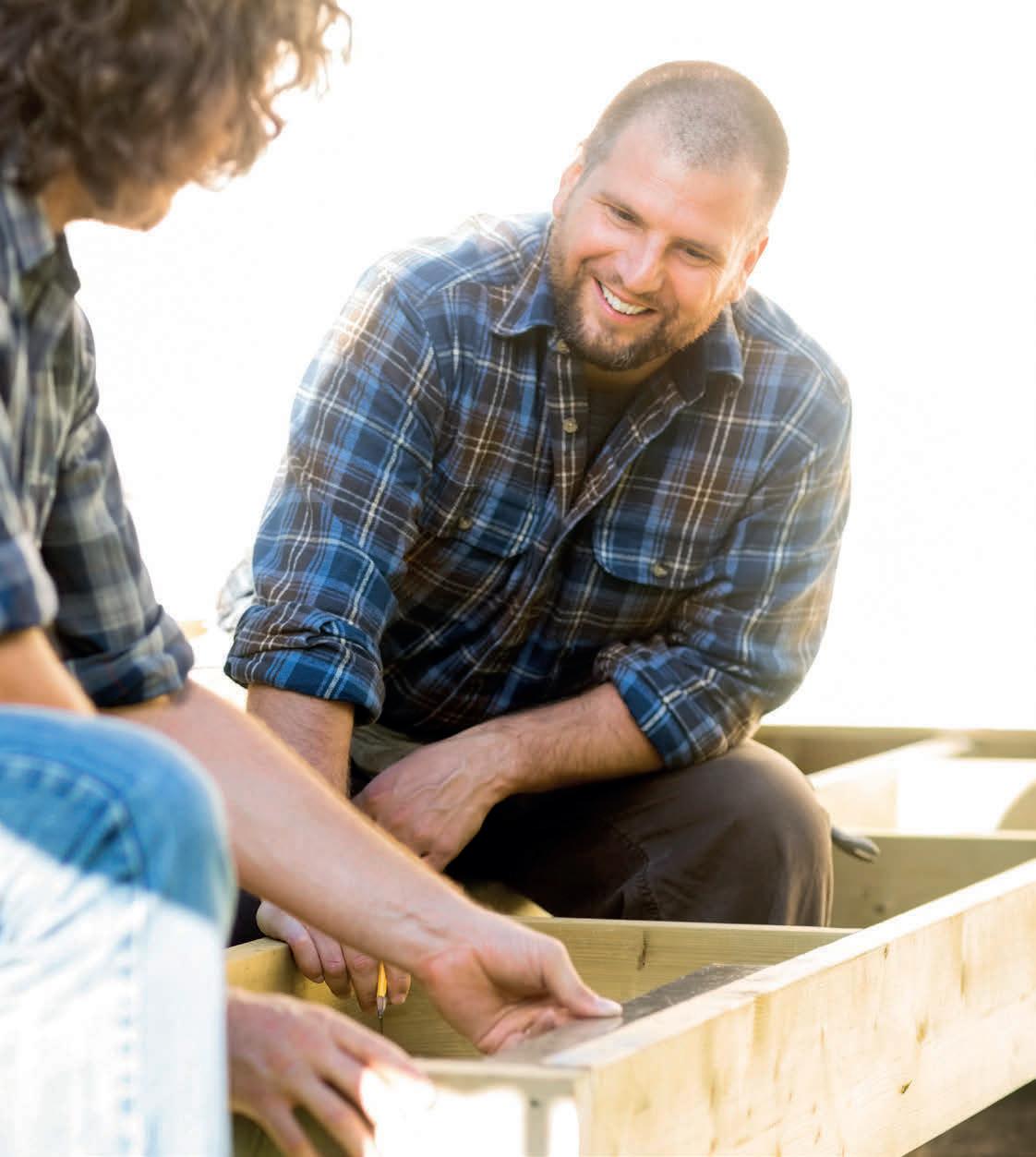
What we have found from the research so far is that shed leaders agree on the importance of supporting their members. All but one of the sheds had a stable or increasing membership base. They expressed some concern about the age profile of their members and there is clearly a need that we must address how we can attract younger member to the men’s shed movement. There is a general perception amongst shed leaders that you need to be old but not too old to be a men’s shed member. The shed leaders were very also aware of their role in looking after their members and their members’ welfare. Examples of this include sheds keeping a register of attendees and calls if someone misses two weeks in a row to check on them.
There is much more to come from this research, so watch this space.
Professor Kirsten Holmes

BA (Hons), MA, PGCAP, PhD
Professor | School of Management and Marketing
Fellow and Immediate Past Chair of the Council for Australasian Tourism and Hospitality Education CAUTHE): https:// cauthe.org/ Curtin University
2 3 1 Contact the Act Belong Commit team to get started: Email: actbelongcommit@curtin.edu.au Phone: (08) 9266 1705 Be recognised as a mentally healthy Men’s Shed Add your events to our online Activity Finder so people can get involved The Act Belong Commit team can help to promote your activities Become an Act Belong Commit partner. This is a free, easy way to promote your Men’s Shed 20+ listings added to theActivityFinderpermonth! MAY 23 NEWSLETTER 19
The most important tool in the shed
Bill and Bob sharing a coffee and a chat at Cowaramup’s Men’s Shed.
The therapeutic effects of a good cup of tea or coffee are well known but sometimes it’s the company you keep that makes all the difference.
At the Mandurah Men’s Shed, getting together and having a chat over a cuppa while taking a break from working on the tools is not just enjoyable, it is crucial to mental health.
“The socialising is critical to our members’ wellbeing,” shed secretary Trevor Howard said.
“Sitting around the morning tea table is so important – many of our members came to us because they were socially isolated, having retired or lost their partners.
“They had no-one to talk to; a lot of social occasions they may have gone to only catered for couples, not single men.”
With 48 active members, 10 of which have joined in the past month, the Mandurah shed is a hive of activity with people bustling around the tools and stacks of timber with great purpose.
The shed specialises in making wooden toys from recycled and donated timber and has been doing so for 23 years.
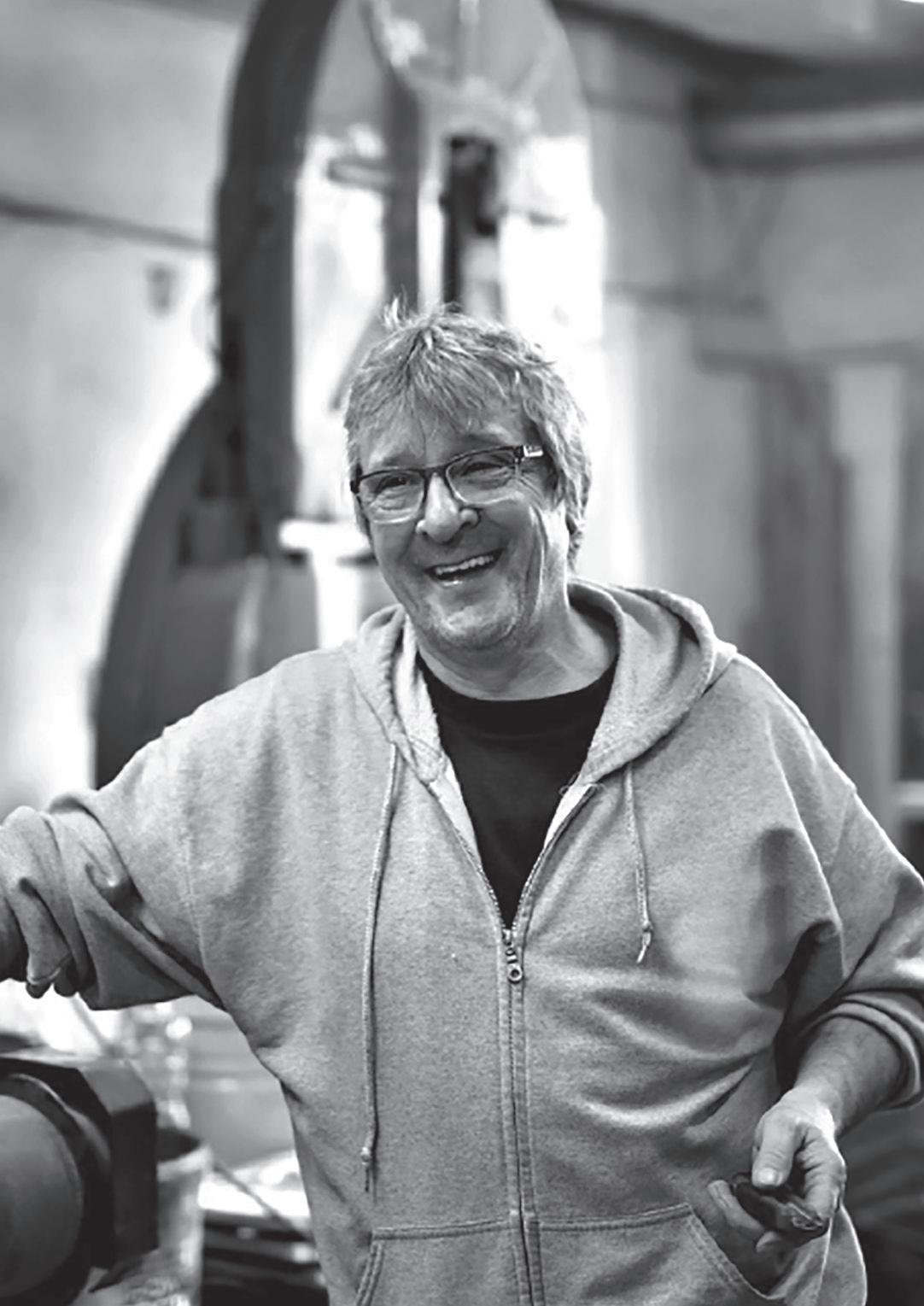
“We call them forever toys,” Trevor said. “If you break a plastic toy, it’s no good anymore, but a wooden toy can always be fixed.”
This environmental ethos is shown in almost everything the shed’s members do, from collecting unwanted timber destined for the rubbish tip to upgrading community facilities such as retirement homes and childcare centres and building safe homes for local wildlife in the form of possum and bird boxes. Also busy is Trevor’s phone, which rings every ten minutes or so as we sit and talk about the work of the Men’s Shed. Most of the calls come from people who have seen the group on social media.
All of them need help in some way – help which Trevor is more than happy to provide.
“We are happy to help out and respond to all enquiries, whatever they may be.” he said.
“Every day I get calls ranging from just wanting some DIY advice, to wanting to know more about becoming a member.”
The group is embracing tools such as the internet to ensure the work done by the shed, and the number of people it helps, continues to grow.
A new website is in the planning stages, facilitated by the purchase of all-new computer equipment.
“It just makes us so much more accessible,” Trevor said.
“Not only can we upgrade our means of communication but members can use all the equipment for their own purposes.”
As useful a tool as technology is, it’s the oldfashioned art of conversation that Trevor finds most important.
“The typical bloke doesn’t want to talk much, they just want to come here and be occupied,” he said.
“But often there is something on their mind and it’s at morning tea time that it comes out.
“It helps to just sit and talk things over with other blokes.
“The best tool we have in the shed is the morning tea table.”
Such is the camaraderie forged around having a cuppa together, the shed members become important parts in each others’ lives.
“If someone hasn’t been around for a little while, we will give them a call just to check they are alright,” Trevor said.
“Men’s mental health is the background for everything we do.”
20 sheds wa

MAY 23 NEWSLETTER 21
Victoria Park, Project: Soldiers + Sirens
Interviewed: Keith Barnett/Evan Jackson
By: Amanda Haines
All Shedders know the importance of community support in staying mentally fit so when the opportunity arose to provide some much-needed help to the team in blue, the Victoria Park Men’s Shed jumped at it.
The Shed opened its doors to welcome in a group of police officers recently for a two-part program which highlighted the stress-busting benefits of woodworking –something shedders have known about for some time and which they were only too happy to share.
The Creative Wellness for First Responders program, run through the charity Soldiers + Sirens, helps first responders from the police, firefighters, paramedics and the military to look after their mental health and well-being.
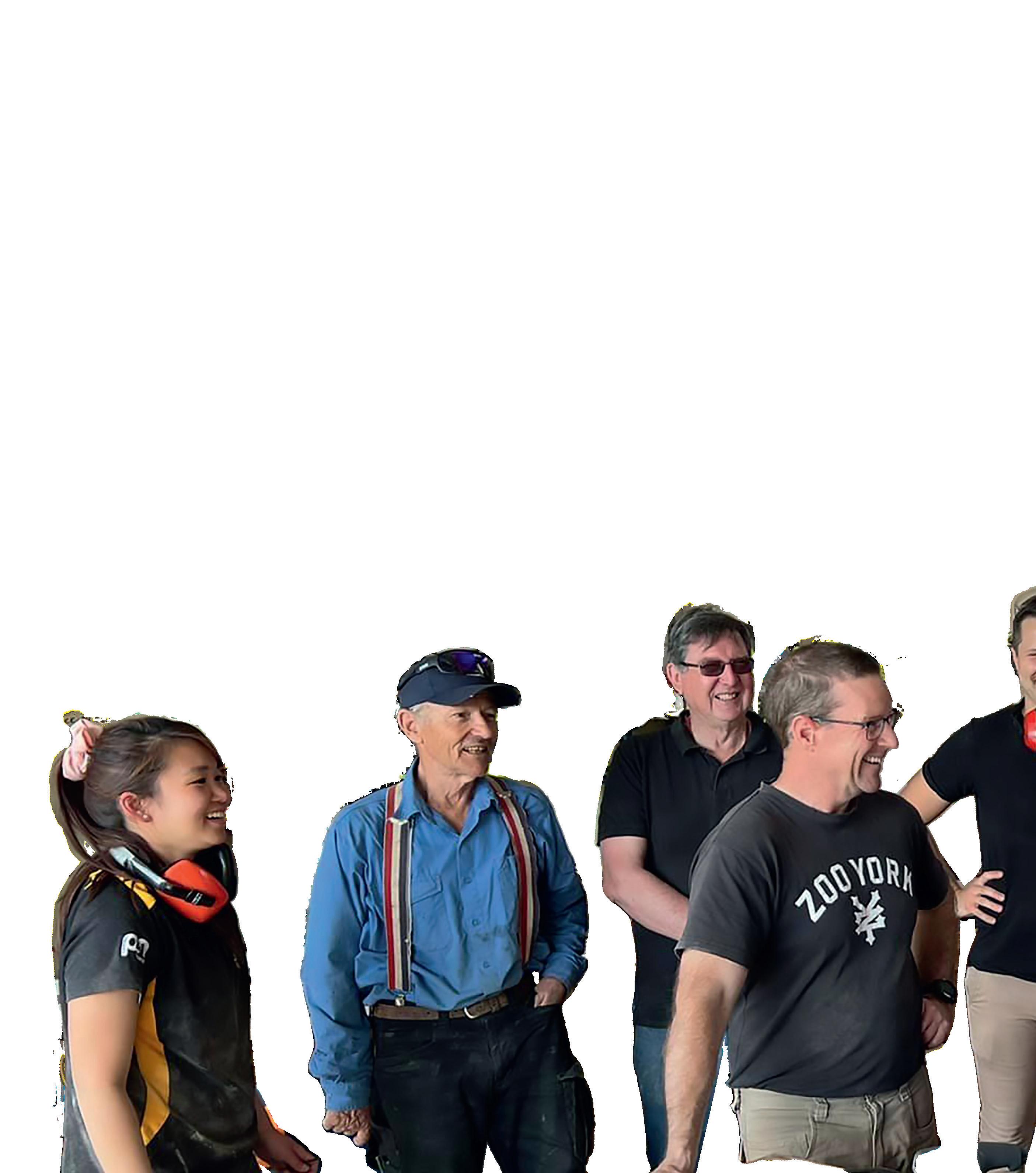
The collaborative program was led by RAAF chaplain Andrew and woodworking teacher Nathan, with help from the shed members.
Victoria Park Men’s Shed president Keith Barnett said while the reason for
the workshops was a serious one, the 12 participants from the forces had a lot of fun.
“The workshops were meant to run for two hours but they went longer, they were that enthusiastic – it was great to see.
“They picked what they wanted to make – one guy made a toybox for his son for Christmas, one made a guitar stand, others made picnic trays.”
In contrast to the light-hearted activity, the statistics behind the working life of first responders are sobering.
Witnessing traumatic events on what can be a daily basis often takes a significant toll on health, relationships, families, careers and social lives and can lead to depression, anxiety and post-traumatic stress disorder.
Detective Senior Constable Evan Jackson said those in the first responder community were 800 per cent more likely to experience serious work-related mental health disorders than those in other occupations.
22 sheds wa
This is exacerbated by the fact that more than 71 per cent of police report that they are hesitant to report mental health related issues.
“This leads to the challenging situation where the people that are most at risk, are also the least likely to seek help,” he said.
“This is an issue that affects the community at large.”
Evan said that despite the constant whir of machinery, the dust in the air and the smell of freshly cut timber, every one of the participants left having found peace –and a new hobby.
“Woodwork has the benefit of being incredibly mindful, distracting you from the world, and inviting you to pour your energy into it,” he said.
Keith said the feedback received from the participants was heartening for all the shed members, and made it more than apparent that workplace stress affects not only those directly involved but also those close to them.
“A guy came in with his partner to pick up a board he had been working on and his partner took me aside and she said he had been really anxious and down but after
attending the workshop, he had enjoyed it so much he couldn’t stop talking about it.
“Another had been very depressed and after going on the course was able to identify the warning signs which he saw in a colleague who was struggling with the same issues, so he was able to help him.”
Being able to spot the warning signs of depression is something the Shedders also have in their tool-kit.
“Mental health is very important to us and if we see someone is a bit down, we will talk to them,” Keith said.
“Shed members s are usually over 60, most are retired, and as people get older they get illnesses and have to deal with loss, so we reach out to help them.”
These shared experiences and reaching to help have long-lasting benefits for both the Shed and the Creative Wellness program.
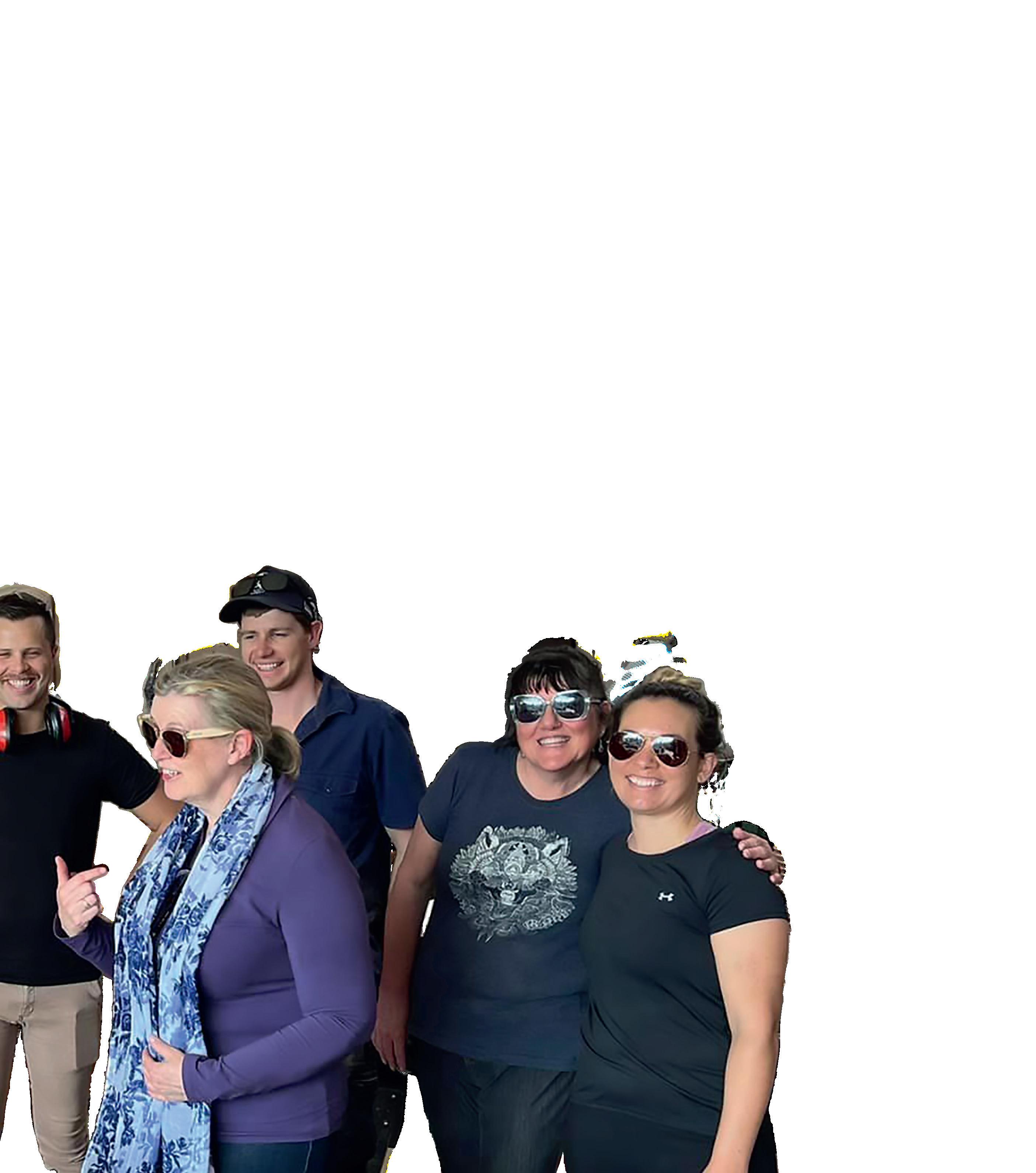
“Forging stronger bonds with people in the community, that’s what the shed gets out of it,” Keith said.
“It really brings it home, seeing other sectors of the community who have mental health struggles of their own, such as the police; seeing them open up, that helps us too.”
MAY 23 NEWSLETTER 23
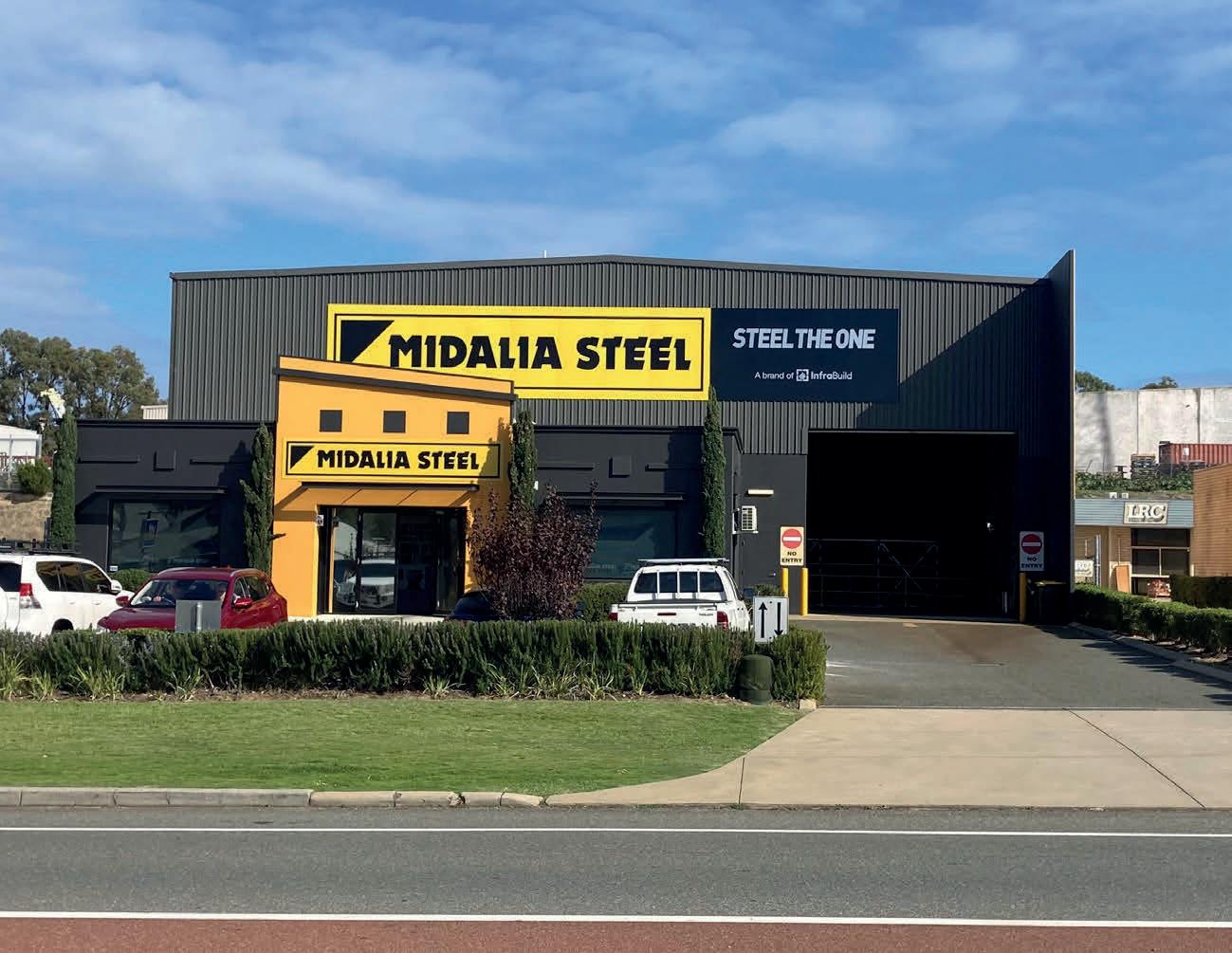
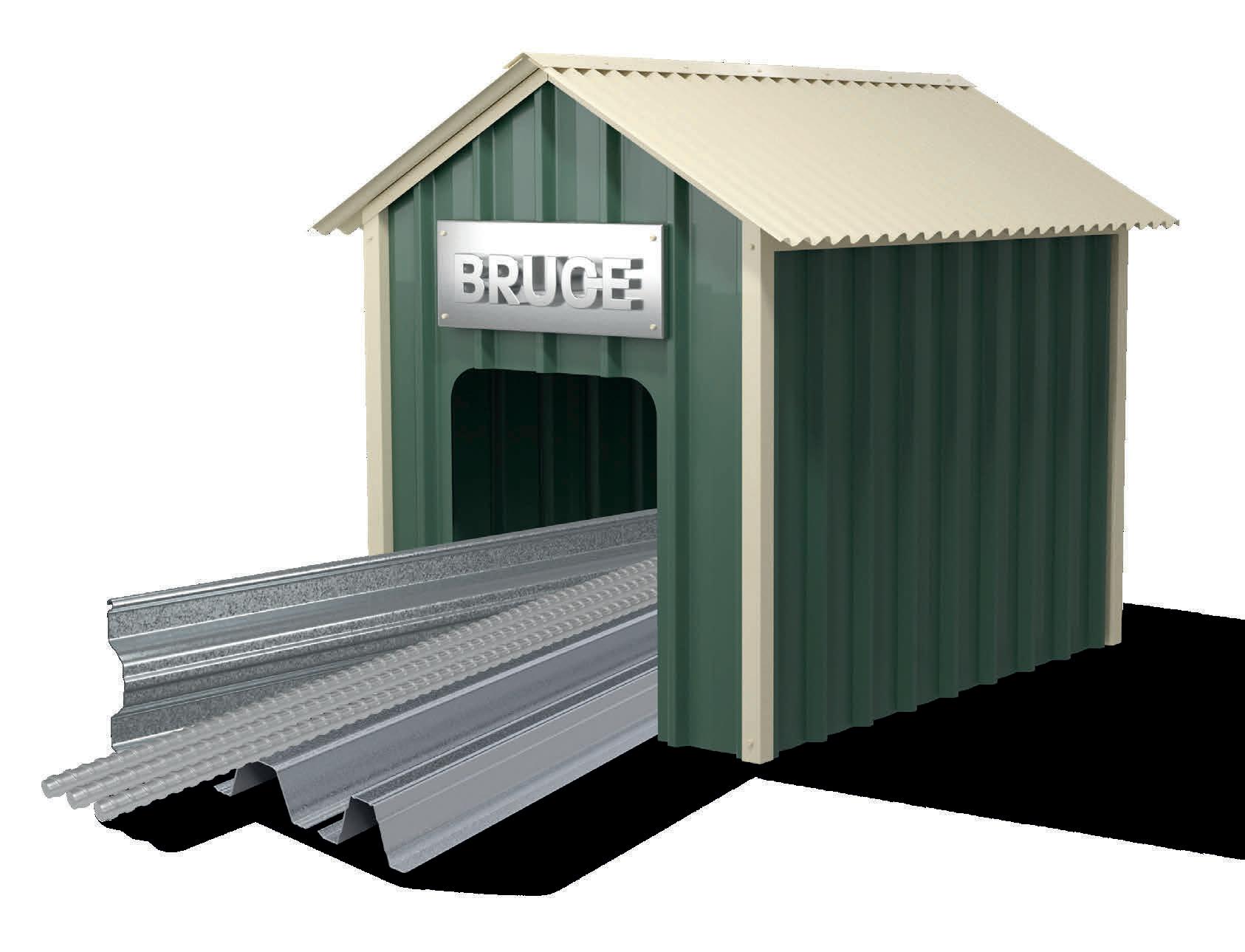
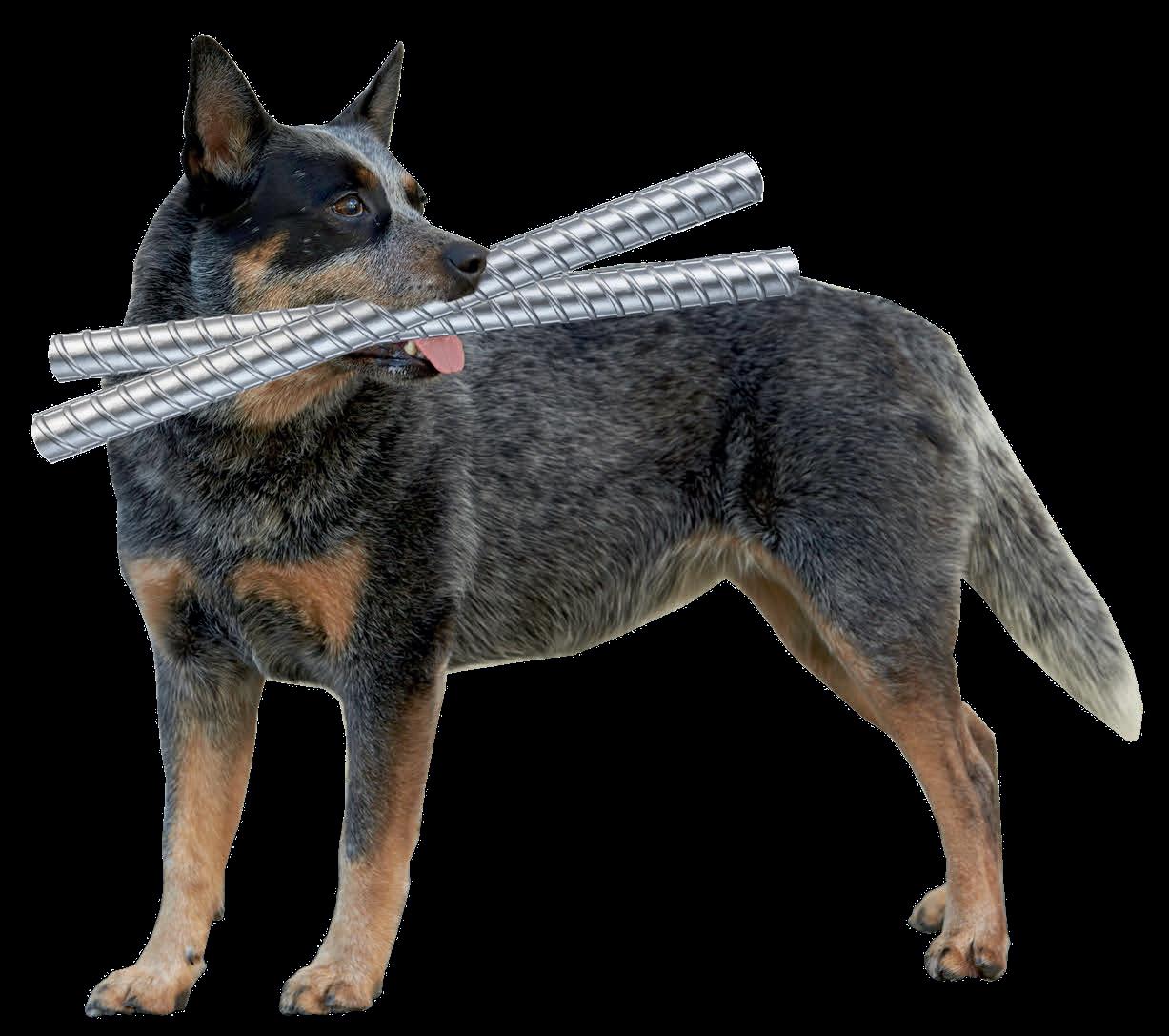
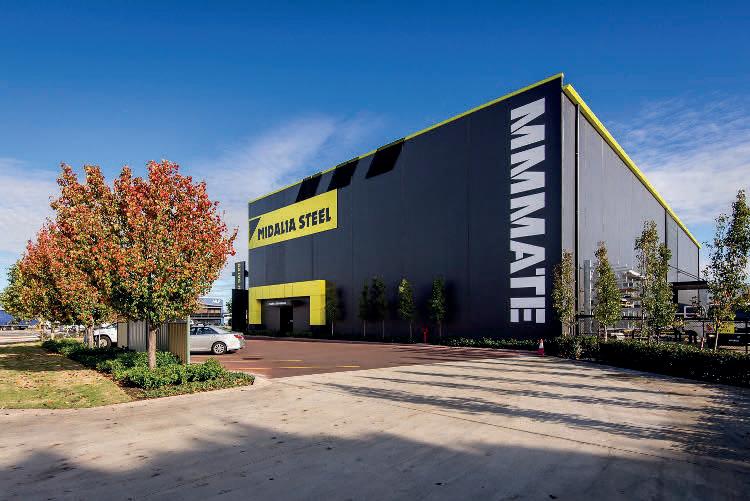
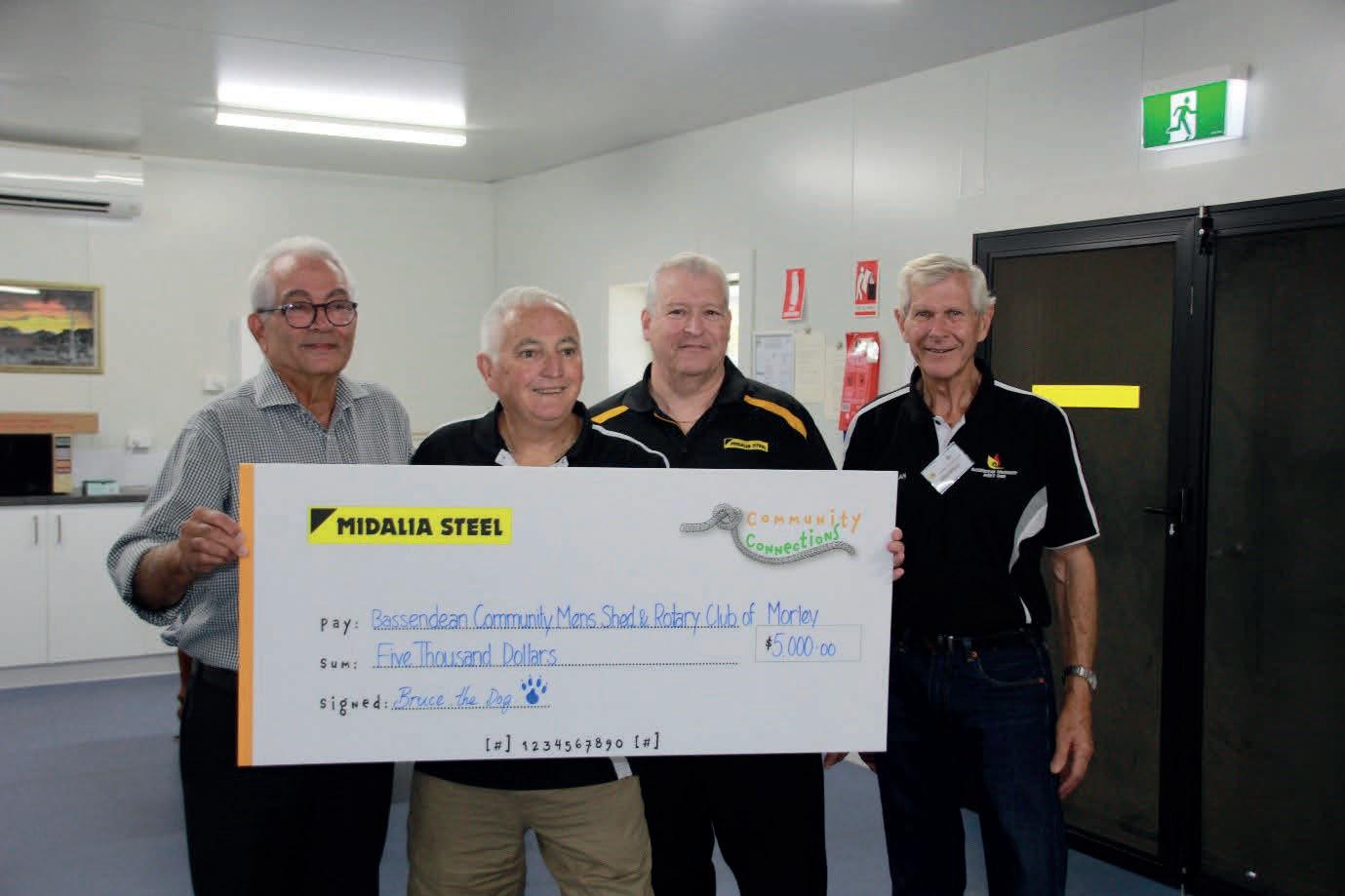
Call 1300 MMMATE (1300 666 283) www.midaliasteel.com TWITTER.COM/MIDALIASTEEL FACEBOOK.COM/MIDALIASTEEL FROM OUR SHED TO YOURS
Helping our community
….its just what we do!
Helping out comes naturally to the shedders at Yanchep Community Men’s Shed. About an hour from the Perth CBD, Yanchep is, in the words of shed president Malcolm Gow, “its own little city” – one which also happens to share a great community spirit. “We are a little bit isolated here, we are away from the major areas like Wanneroo, but that just makes it more important to help out in the community.”
It is Yanchep’s isolation from some social services which has fuelled great demand for a program which ensures local residents who may be doing it tough don’t have to stress about where their next meal is coming from. The Foodbank WA mobile service visits Yanchep once a week to supply inexpensive meat, vegetables and pantry staples to those in need, from the convenient distribution point of the Yanchep Community Men’s Shed.
“There is an exceptionally high need for food relief in Yanchep and surrounding suburbs and a lack of services extending beyond Joondalup,” Foodbank WA Chief Executive Fran Ferreira said. “Struggling families often don’t have the means to travel to our centre at Perth Airport, so it’s vital we get the food to where it’s needed.”
Malcolm said the shed was only too happy to help out. “The mobile Foodbank truck has been coming here for 12 months and it has proved very popular. It started small and gradually built up as more and more people heard about it – it has become so popular they have added a second location, it’s expanded to Two Rocks.
“There is definitely a big demand for it.” With many businesses closing due to Covid, the knock-on effect has meant some people are still struggling to make ends meet.
Add to this the vulnerable people in our community, and it is clear there was an
urgent need for the Foodbank service in Yanchep.
“The service was not being provided anywhere else in the area so it was important that we help out,” Malcolm said. “It is of major importance for us to help out in the community, it is not just a casual thing.”
He said many who relied on the Foodbank truck were out of work, those with a disability, or senior citizens – and also some members of the shed itself.
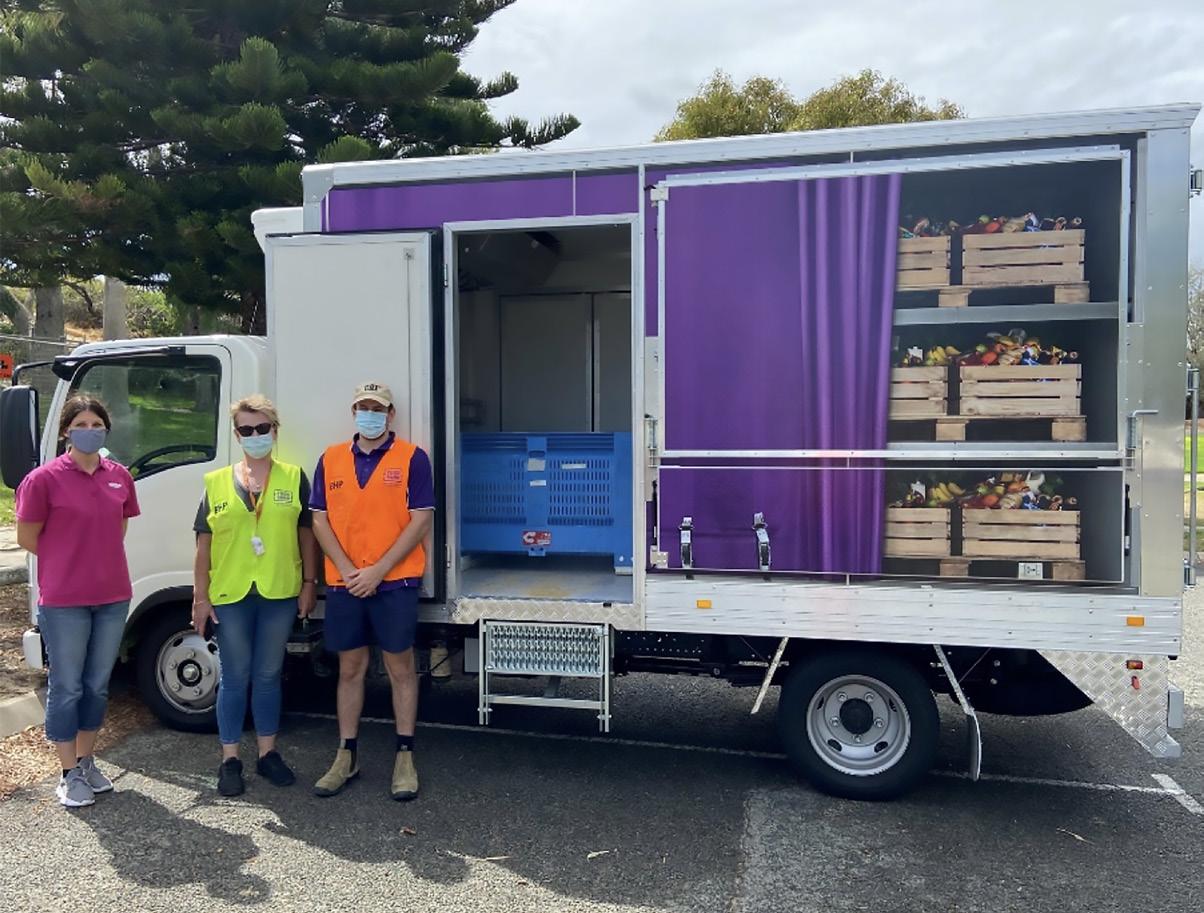
In fact, the shed has become something of a one-stop-shop for community services, as it is also a collection point for Containers for Change, the recycling program which raises funds for important causes.
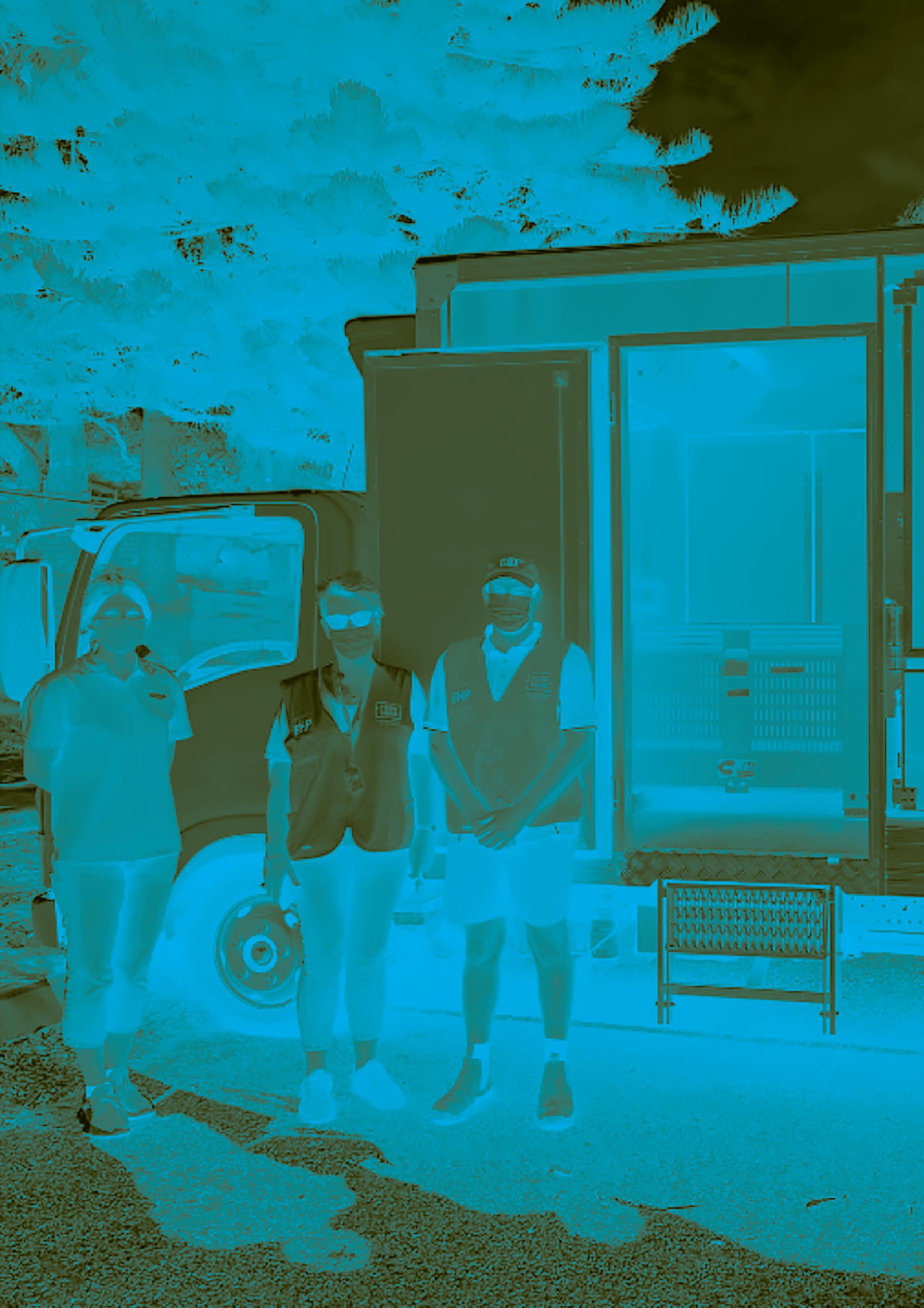
The added interest in the shed, along with the usual shed activities of supplying local businesses with picnic benches and local
schools with special projects, means it is in great position to expand. The Yanchep Shed committee is now working with Men’s Sheds of WA and the City of Wanneroo to plan for a bigger site.
MAY 23 NEWSLETTER 25



















































